
































Bucci Franklin is an actor, TV host, and presenter whose talent continues to shine. After studying Theatre Arts at the University of Abuja, he didn’t immediately get an acting gig, so he took presenting jobs until he found his footing in Nollywood. Unlike most people, Franklin did not have a turning point when he knew Nollywood was truly for him. He believes in reincarnation and sees this journey as one he has experienced before, so he always knew Nollywood was for him. Franklin always carries a positive outlook on life in the sense that what people see as battles, obstacles and scars, he views as moments and experiences to be grateful for. He admits that moving to Lagos from Port Harcourt and taking any job that came his way until he got his break with AY was a bit of a challenge.
There’s a thing or two to learn from Bucci Franklin’s attitude to life. Read his story on pages 8 through 10 of this issue.
Denim shorts are always in style, but even your favourite pair can start to feel too familiar. Switch things up. Our fashion pages show six options you can choose from instead of denim shorts. Scroll to pages 4 and 5.
Have you ever been in a situation where you are comforting a friend of the opposite sex over a heartbreak, and then it turns sexual? Our Downtown Confidential story this week plays out like that. Read the story on page 15.
Our movie reviewer finally reviewed Mission: Impossible—Final Reckoning this week. Although he didn’t score it high, I’m still looking forward to seeing it. His review is on page 16.
Until next week, enjoy your read.








SUNDAY, JUNE 29, 2025 THEWILL NEWSPAPER • www.thewillnews.com





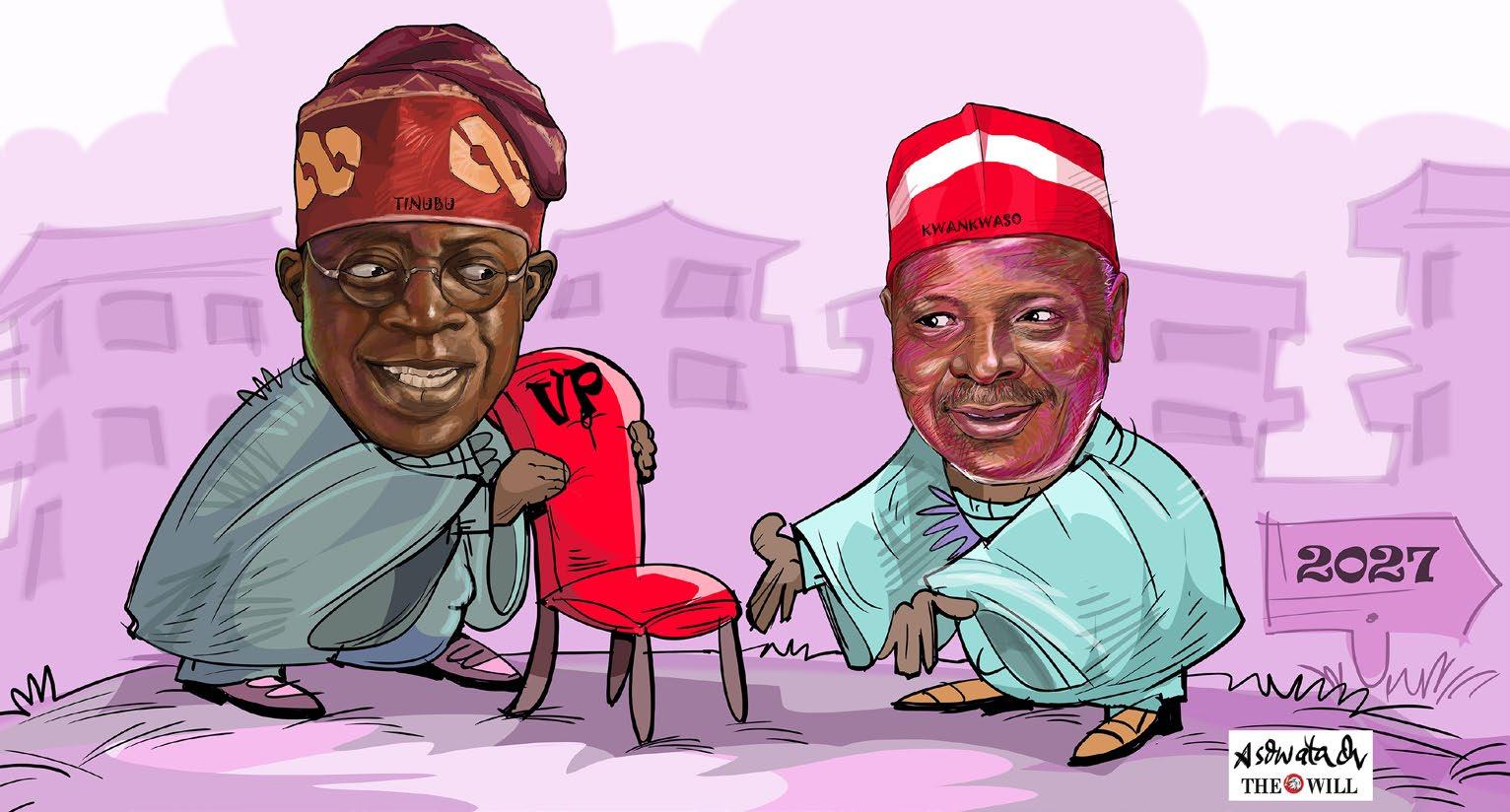
BY AMOS ESELE
For the second time in two weeks, the ruling All Progressives Congress, APC, is going through a political upheaval of seismic proportions. Just when the leaders, stakeholders and members of the party were still recovering from the disruption caused by the unexpected fiasco at the North-East Zonal Party Delegates Summit, following disagreements over the non-endorsement of Vice President Kashim Shettima alongside President Bola Tinubu for the 2027 general election, one of the dramatis personae in that event and the National Chairman of the party, Dr. Abdullahi Ganduje was suddenly booted out of office on Friday.
The major reason for this presidential fiat, it turned out, was to let Ganduje go in order to admit Dr Rabiu Kwankwaso into the party. Kwankwaso, who was the presidential candidate of the New Nigeria Political Party, NNPP, in the 2023 general poll, holds the key to the political permutations of the president’s camp ahead of 2027.
As reported exclusively by this newspaper in its last Sunday cover story titled, ‘2027: Shettima Going..., Going…, Going…’ the President’s camp had perfected a plan to woo Dr. Rabiu Kwankwaso into the APC as the most viable replacement of VP Shettima, ahead of the 2026 presidential primaries of the party.
his rivals but using it to get to the finishing line is quite another thing.
The plan, therefore, is to woo Kwankwaso into the party and let the President see his impact before taking a crucial decision on the 2027 general election.
The former Kano State governor, who is Ganduje’s predecessor in office and his archrival carries more political punch in the NorthWest geopolitical zone, which was critical to the President’s victory in 2023 but is now threatened by coalition politicians riding on the wave of threats from insecurity and hunger in the land.

The party immediately appointed Hon. Ali Bukar Dalori, Deputy National Chairman, North, as the acting National Chairman.
A dependable party source told THEWILL that the “Man on whose desk the buck stops had to take a decision because the National Chairman had become a stumbling block to progress.”

Current political realities in the country, which are likely to pose a serious challenge to Tinubu’s re-election, are said to have caused the President to change his mind about getting involved in 2027 politics now.
One of the present realities facing the President, sources say, is the fact that controlling the federal structure is a huge advantage against
Apart from the Northeast fiasco, the other factor that quickened Ganduje’s exit is what a source called, “the Senator Ali Ndume Factor”.
In what is now referred to as the ‘Senator Ali Ndume’s factor,’ the President’s camp is said to have got further confirmation of the
unsuitability of VP Shettima in their calculations for the President who has been endorsed by stakeholders as the party’s sole candidate for the 2027 election.
The Senator representing Borno South on the platform of the APC disclosed in a national television interview last week that he has been attending meetings of the opposition coalition politicians and would defect to join them if the Bola Tinubu Administration failed to improve on its policies that are impoverishing Nigerians.
Considering that Senator Ndume comes from, “not just the Northeast zone but also the VP’s state”, as a source puts it, is enough confirmation that “Shettima has lost control of his backyard.”
Senator Ndume said in the interview that “I’m aware of the opposition coalition. I have attended some of their meetings. I still believe this president can fix these things, but failure might cause me to move. The overloaded ship will sink.”In addition, Governor Babagana Zulum, whom the VP handpicked as his successor once raised eyebrows in the presidency when he harshly criticised the government’s tax policy during the town hall meetings held across the country to sensitize Nigerians to the components and implications of tax laws. President Tinubu signed the four tax reform bills, aimed to modernise and streamline Nigeria’s tax system, into law on Thursday, June 26, 2025. The new tax laws take effect from January 1, 2026.
The ‘Senator Ndume’, factor brought the governor’s critique into fore again, said the source and further complicates matters for the VP.
in the North-West, though on a comparatively lower scale than Buhari. This makes him suitable to be lured into the ruling party to enable it maintain its grip on the geopolitical zone. Nigerian political parties are not ideological.
The North-West is made up of some of the highest voting states in the country, notably Kaduna, Katsina and Kano, beside Sokoto, Zamfara, Kebbi and Jigawa which make the zone one with the highest number of states, totalling seven, in the country. Moreover, this zone gave President Tinubu the highest number of votes in the 2023 general election.
A state-by-state analysis of votes cast in the zone shows that the presidential candidate of the PDP and opposition coalition leader, Atiku Abubakar won in four out of the seven NorthWest states, namely Kaduna, Katsina, Kebbi and Sokoto. President Tinubu won in only two, namely Jigawa and Zamfara. Dr. Rabiu Musa Kwankwaso, candidate of the New Nigeria Peoples Party (NNPP) took his home state, Kano. In Kano, Tinubu polled 517, 341 votes; Dr Kwankwaso scored 997,279 votes; Atiku Abubakar came third after polling 131,716, while Peter Obi, the Labour Party, LP, candidate, came fourth with 28,513 votes. But when it comes to the total number of votes cast for each of these three candidates in the North-West, Tinubu led the pack.
Tinubu led with 2,652,824 votes, compared to Atiku’s 2,197,824 votes. Kano, where Tinubu got almost half a million votes, did the magic. Overall, Tinubu got 30 per cent of the total number of 8,794,726 votes he scored in the 2023 election from the North-West. This is almost one-third of the total votes he scored in the entire poll. In comparison, the South-West, where he hails from, gave him 2,542,979 votes.
Compared to the North-West, the North-East where VP Shettima hails from returned a total of 933,176 votes for President Tinubu, trailing Atiku who polled 1,741,846 votes. Shettima, however, delivered the votes of his home state, Borno State, which Tinubu won with 252,282 votes, compared to Atiku’s 190, 921 votes. Another challenge facing the APC in the North-East is that the party and its main rival, the PDP are head -to- head in the control of the six states there: The PDP governs in Bauchi, Adamawa and Taraba while APC governs in Borno, Yobe and Gombe.
Regionally, however, Tinubu had a better showing in the North than in the South. Of the total number of 13, 716,667 votes cast in the Northern region, Tinubu got 5,346, 404 votes, followed by Atiku who scored 4,834, 767 votes, Obi who polled 2,080,847 votes and Kwankwaso who polled 1, 454,649 votes.
This impressive showing by the President in 2023 in the North is being threatened by the ongoing political coalition, whose leaders are capitalising on the hardship and worsening insecurity in the country to drive their agenda, especially in the North.
These leaders include Atiku, Peter Obi, former Kaduna governor, Nasir el-Rufai, ex- National Vice Chairman of the APC, Salihu Lukman, former Transportation Minister, Chibuike Amaechi, former Cross River State governor, Liyel Imoke, former senate president David Mark and former presidential aide, Prof Umar Ardo, as well as many other political bigwigs across political parties in the country.
KWANKWASO AND KANO FACTORS


Another factor that, in retrospect, has featured in the calculations of the President’s camp is the expression of political neutrality by former President Muhammadu Buhari. The former President who still has a significant cult following in the North, particularly in the critical North-West which his Katsina State belongs to, has repeatedly said that he would continue to support President Tinubu, but allow the people to exercise their political choices. The President’s men see this as a red flag. In fact, recent rumblings in Buhari’s former party, Congress for Progressives Change, CPC, is a clear indication of the impact of Buhari’s neutrality which has unsettled the President’s men.
Kwankwaso is believed to still have a cult following within the Kwankwasiyya Movement
“ Kwankwaso is believed to still have a cult following within the Kwankwasiyya Movement in the North-West, though on a comparatively lower scale than Buhari. This makes him suitable to be lured into the ruling party to enable it maintain its grip on the geopolitical zone
Apart from having arguably the highest voter population in the country, Kano is a key state in the all-important North-West geo-political zone. Among the six other states, Kano is king when it comes to voting strength. In addition, it has a unique quality: It is free from insecurity that plagues and reduces the political integrity of all the other states in the zone, courtesy of the state- of -the art security infrastructure built by ex-Governor Abdullahi Ganduje. Picking a VP from the North-West, the President’s camp reckons, is the best way to secure it and prevent the coalition from taking it.
Multiple sources told Kwankwaso will accept the offer which could be the surest and safest path to his bid to rule the country. Currently his party, the NNPP is factionalised. The party’s National Chairman, Dr Agbo Major said recently that the former Kano governor remained expelled from the party, just as one of its Senators from Kano, Abdulrahman Kawu, recently defected from the party alongside some other party representatives from Kano State.



L-R: Vice President, Dangote Industries Group, Mr. Devakumar Edwin; Group Managing Director/CEO, Nigerian Exchange Group (NGX Group), Temi Popoola; President, Dangote Industries Group, Alhaji Aliko Dangote; Group Chairman, NGX Group, Alhaji Umaru Kwairanga and Managing Director/ CEO, Central Securities Clearing System (CSCS), during NGX Group Board Members and Capital Market Stakeholder visit to Dangote Refinery and Dangote Fertilizer in Lagos on Thursday, June 26, 2025.
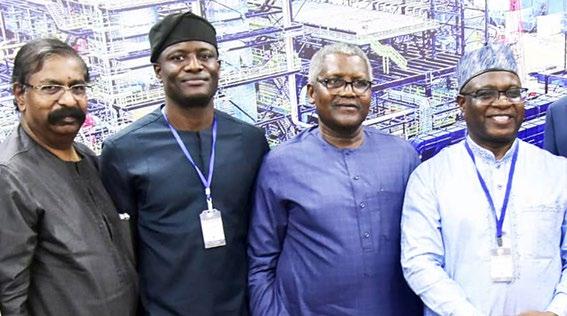
The Economic and Financial Crimes Commission, EFCC, on Thursday, June 27, 2025, opposed an application filed by former Kogi State Governor, Yahaya Adoza Bello, seeking leave of court to travel abroad for medical treatment.
The application was presented before Justice Emeka Nwite of the Federal High Court, Maitama, Abuja, during the resumed hearing of Bello’s alleged 80.2 billion money laundering trial. His counsel, J.B. Daudu, SAN, urged the court to consider the defendant’s health condition as paramount and to grant him permission to travel.
Daudu informed the court that the application was brought pursuant to Section 173(2)(a) of the Administration of Criminal Justice Act (ACJA) and under the court’s inherent jurisdiction. He said the application was backed by a 22-paragraph affidavit deposed to by the defendant himself, including annexures such as a medical report and a letter from a consultant cardiologist.
He further argued that Bello had not travelled outside Nigeria in over eight years and now required urgent medical attention


which, according to him, cannot be provided even in the hospital he built. “The subject of this application is the release of his passport, which was surrendered as part of his bail conditions. What should be considered is not whether there are alternatives in Nigeria but whether the defendant poses a flight risk,” he said.
He also claimed that the defendant has no criminal record abroad and may not pose a flight risk. “He has no criminal record in those countries. The defendant is not a flight risk and will return before the end of August. My lord can even specify a return date,” he said.
However, prosecuting counsel, Kemi Pinheiro, SAN, strongly objected to the application, describing it as an abuse of court process. He argued that Bello had previously filed similar applications before another court, the current court and the FCT High Court, seeking the same relief, which he said was improper and confusing.
Pinheiro advanced five main reasons the application should be denied. First, he said the motion was “technically
incompetent” as the sureties to Bello’s bail were not informed or included in the application, thereby raising questions about their liability if the defendant fails to return.
He also emphasized that the case involved money laundering, and money laundering is international in nature, referencing charges related to properties in Dubai and funds in bank accounts in the US and UK. “The defendant is already under a red notice and international alert. He risks being arrested abroad and extradited. He could be ‘Hushpuppied’ from Dubai,” Pinheiro warned, alluding to a known cybercrime case.
The prosecution further discredited the medical report submitted by the defence, noting that the doctor who signed it failed to indicate his qualifications or specialization. He argued that the health concerns mentioned, such as low potassium and mild hypertension, could be managed locally. “He says he has low potassium; bananas and pawpaw will handle that. This is not sufficient reason to fly to the UK,” he said.
BY FELIX IFIJEH
President Bola Tinubu departed Abuja on Saturday, June 28, on a two-nation visit to Saint Lucia and Brazil. A statement signed by Bayo Onanuga, his Special Adviser on Information and Strategy, said the President will make a stop in Saint Lucia, where he will pay a state visit as part of efforts to deepen Nigeria’s engagement with Caribbean nations and strengthen SouthSouth cooperation.
At the end of the visit to the island State, President Tinubu will fly to Brazil to participate in the 17th Summit of BRICS in Rio de Janeiro. During the visit to Saint Lucia, President Tinubu will pay courtesy calls on the Governor-General, His Excellency Cyril Errol Melchiades Charles, and Prime Minister Philip Pierre. A key highlight of the visit will be President Tinubu’s address to the special joint session of the Senate and the House of Assembly of Saint Lucia at the William Jefferson Clinton Ballroom, Sandals Grande, Gros Islet. The Heads of Government of the Organisation of Eastern Caribbean States (OECS), senior government officials, members of the diplomatic corps, members of the Nigerian
community in the country and the Director-General of OECS, Dr Didacus Jules, have been invited to attend the special session.
President Tinubu will hold a high-level working luncheon with the Heads of Government of OECS, after the joint session of the Parliament of Saint Lucia. Discussions at the luncheon will focus on specific parameters to deepen cooperation between Nigeria and the OECS for shared prosperity through economic partnerships and cultural solidarity. According to the President’s itinerary, he will visit the Sir Arthur Lewis Community College in Castries to strengthen educational ties and promote academic exchange.
President Tinubu’s visit underscores Nigeria’s commitment to strengthening diplomatic and economic relations with Caribbean states, especially within the African Union’s Sixth Region framework, which recognises the African diaspora as an essential partner in the continent’s development.
Nigeria and Saint Lucia share ties through membership in international organisations such as the United Nations and

the Commonwealth of Nations, and they have a common heritage rooted in African ancestry. The visit is expected to open new pathways for infrastructure development, educational cooperation, youth empowerment, and diplomatic exchange. Following his engagements in Saint Lucia, the President will proceed to Brazil to participate in the 2025 BRICS Summit in Rio de Janeiro from July 6-7, 2025.
President Tinubu is attending the summit at the invitation of President Luiz Inacio Lula da Silva of Brazil, on the strength of Nigeria’s status as a ‘partner country’, a membership category short of full status. The Partner status is higher than that of a guest country, as has been the case in the past. South Africa, Egypt and Ethiopia are African members of BRICS.
The 17th BRICS Summit will focus on “Strengthening Global South Cooperation for More Inclusive and Sustainable Governance”. Discussions will prioritise two key areas: Global South Cooperation and BRICS Partnerships for Social, Economic, and Environmental Development.
L-R: Senate Majority Leader, Opeyemi Bamidele, deputy President of the Senate, Jubril Barau, President of the Senate, Godswill Akpabio, President Bola Tinubu, Governor of Kwara State, AbdulRahman AbdulRazaq, Governor of Imo State, Hope Uzodinma, Minister of Finance and Coordinating Minister of Economy, Wale Edun, and Chief of Staff to the President, Femi Gbajabiamila, during the signing of Tax Law by the President at the Presidential Villa, Abuja, on Thursday, June 26, 2025.
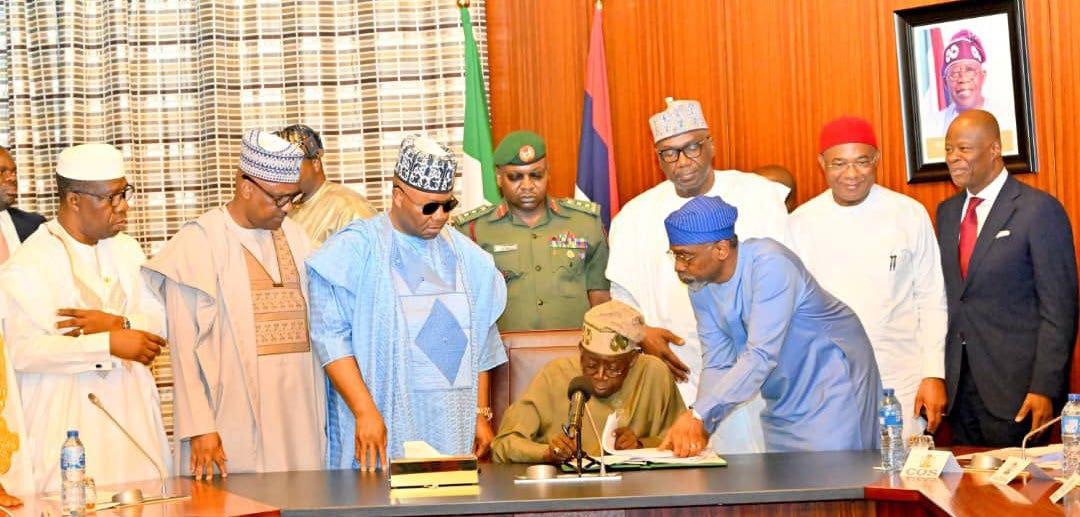
BY FELIX IFIJEH
Founder and President/Chief Executive of the Dangote Group, Aliko Dangote, has identified erratic electricity supply and inconsistent government policies as major obstacles to Africa’s industrialisation.
Dangote made this known during a panel session at the 32nd Annual General Meeting of Afreximbank. The session, which focused on the theme “The Path to Making Africa Great Again,” was moderated by CNN anchor and correspondent, Eleni Giokos.
The billionaire industrialist said Africa’s industrial growth has been stunted by chronic infrastructural deficiencies, particularly unstable power supply, and unpredictable government policy shifts. He commended Afreximbank for its instrumental role in supporting the Dangote Refinery project, stating that with 10 similar institutions across the continent, Africa would become a global economic force within a few years.
stay focused. It’s not just about amassing wealth, but about creating value through job creation,” Dangote said. According to him, power remains a fundamental challenge. “If there’s no power, there won’t be growth. For example, anything I want to do abroad will cost me 30 per cent less because it’s plug-and-play—no need to build infrastructure.
“You just connect your factory to the grid. But in Nigeria, we had to invest heavily in electricity generation for the refinery and our other factories. This doesn’t happen in developed countries,” he said. Beyond power, Dangote criticised frequent changes in government policies as another major stumbling block to investment and industrialisation across the continent. “One of the problems is policy inconsistency. It’s like being a footballer about to score, and then the government moves the goalpost and tells you it’s now behind you.
jobs they generate.He warned that when businesses shut down due to these constraints, governments are the biggest losers in terms of lost revenue and rising unemployment.
Advocating for an “Africa First” strategy, Dangote encouraged Africans to invest locally rather than abroad, taking a cue from Asia’s development model.

“We are the only ones who can make Africa great. Yes, there will be ups and downs, but we must
“So you have to turn back and face new challenges all over again,” he said. Dangote urged governments to recognise that they are the biggest beneficiaries of successful industrial ventures due to the taxes and
“If we invest abroad, it becomes difficult to convince foreigners to come invest here. We must build a strong manufacturing base, improve agricultural systems, and strengthen our financial institutions,” he said. He also revealed plans to become the world’s largest producer of urea within the next 40 months, noting that 37% of production from Dangote Fertiliser is currently exported to the United States. Reacting to U.S. immigration restrictions, Dangote remarked: “Why are people so eager to go to the U.S.? Everything we need is right here in Africa. Let’s make Africa a productive continent. The potential for growth is enormous.”
South Korean authorities have arrested six American nationals for attempting to send plastic bottles filled with rice, one-dollar bills, and Bibles to North Korea.
The suspects, reportedly aged between their 20s and 50s, were detained in the early hours of Friday while trying to launch the bottles into the sea off Ganghwa Island, located northwest of Seoul. The head of the police investigation team at Ganghwa Police Station in Incheon confirmed the arrests.
“We have arrested and are currently questioning six American nationals on suspicion of violating the Framework Act on the Management of Disasters and Safety,” the officer said. He added: “They could not speak Korean, so an interpreter has been provided as the investigation proceeds.”
Ganghwa Island, one of the closest South Korean territories to North Korea, lies just 10 kilometers (six
miles) from the inter-Korean maritime border. The area has long served as a launch site for anti-North Korea activists and non-profit groups attempting to send messages, supplies, and media across the border.
Activists typically use plastic bottles or balloons to send rice, Bibles, and USB drives loaded with K-pop music, South Korean dramas, and other cultural content, hoping to reach North Korean citizens with information from the outside world.
However, since November, the South Korean government has designated Ganghwa Island and other border areas as danger zones due to the potential for escalating tensions with the North. Authorities have warned that such activities could be perceived as provocative by Pyongyang.
Last year, North and South Korea were locked in a heated propaganda war. North Korea launched


thousands of trash-filled balloons across the border in retaliation for anti-regime leaflets sent by South Korean activists.
In response, Seoul resumed loudspeaker broadcasts along the border, playing K-pop songs and international news, while North Korea countered by transmitting strange and disturbing noises that became a serious nuisance for residents near the border. South Korea’s new president, Lee Jae Myung, who assumed office earlier this month, has promised a more conciliatory approach toward North Korea.
As part of this policy shift, the South has halted its loudspeaker broadcasts—a move that was quickly mirrored by the North, which also ceased its psychological noise campaign. As of press time, South Korean authorities have not confirmed whether the six Americans will face formal charges or deportation.




“We’ve
BY FELIX IFIJEH
Key players in the protracted political crisis in Rivers State, including the Minister of the Federal Capital Territory, Nyesom Wike, and Governor Siminalayi Fubara, have reached an agreement to work together in the interest of peace and stability.
The truce follows a high-level closed-door meeting convened by President Bola Tinubu on Thursday at the Presidential Villa, Abuja. THEWILL reports that present at the meeting were Governor Fubara, Minister Wike, Speaker of the Rivers State House of Assembly Martins Amaewhule, and several lawmakers from the state.
The parley, which is believed to mark a turning point in the nearly two-year political standoff that has crippled governance in the oilrich state, reportedly focused on reconciliation, mutual cooperation, and a shared commitment to restoring political stability.
Speaking to State House correspondents after the meeting, Wike expressed optimism about the outcome, emphasising the renewed
unity among the state’s political leadership.
“We have all agreed to work together with the governor, and the governor has also agreed to work with all of us. We are members of the same political family,” he said.
While acknowledging that disagreements are a natural part of politics, Wike stressed that the time had come to put differences aside.
“That has been finally concluded today, and we have come to report to Mr. President what we have agreed. For me, everything is over. I encourage everyone who believes in working with us to join hands— there is no more acrimony, nothing left to say,” he added.
In his remarks, Governor Fubara expressed gratitude to President Tinubu for facilitating the peace process and underscored the importance of unity for the development of Rivers State.
“For me, it is a day to thank Almighty God. It is very important that this day has come. What we need for the progress of Rivers State is
peace, and by the special grace of God, this night, with the help of Mr. President and the agreement of the state’s leaders, peace has returned to Rivers State. We will do everything within our power to sustain it this time around,” Fubara said.
Post-meeting visuals shared by the Presidency painted a picture of reconciliation. President Tinubu was seen standing between Wike and Fubara, all smiles, while previously feuding lawmakers exchanged handshakes and posed for group photographs—an image in stark contrast to the hostile atmosphere that had long prevailed. It will be recalled that in March, President Tinubu intervened in the crisis by declaring a political emergency in Rivers State, following violent protests, legislative gridlock, and a breakdown in public order stemming from the rift between the governor and the state assembly.
Citing Section 305 of the 1999 Constitution, the President suspended Governor Fubara, Deputy Governor Ngozi Odu, and the entire House of Assembly to prevent further deterioration of governance.
The Managing Director and Chief Executive Officer, Planet Project Ltd, Mr Biodun Otunola, says the Kugbo and Mabushi Bus and Taxi Terminals are designed with the capacity to process more than 10,000 passengers each, daily.
Otunola disclosed this in Abuja on Thursday, on the sideline of the inauguration of the Kugbo Bus and Taxi Terminal by President Bola Tinubu to celebrate his second year in office. He added that the terminals were also designed to accommodate 120 buses and taxis each daily for both intercity and intra-city travels.
He, however, said that the one under construction in the Central Business District (CBD)was different, adding that it was essentially designed for intra-city operations.
“We can take over 120 buses here and we’ve designed this place such that it can handle up to 10,000 passengers every day.
“It’s the same thing with the one in Mabushi as well. The same concept but the one at CBD, which is the third one,
is a bit different.
“The one at CBD is essentially for the city operation within Abuja, while Mabushi and Kugbo are designed to run intracity and intercity operations,” he said.
On job opportunities, Otunola said that each of the three terminals would employ at least 100 persons.
He explained that people would be in the security department, some in the ticketing department, others in facility management, control room, electrical department, mechanical department, maintenance department, annd bus control.
“It’s very huge. It’s like running a mini airport,” he said.
The MD pointed out that Abuja before now has always been about car and road transportation, noting that for the first time, the government had invested in public transport to ensure comfort and security.
He described the facility as a “transportation hub for the masses”, built in tandem with similar facilities found
anywhere in the world.
He added that with this development, people would be able to travel with confidence and without any fear, in a very safe, secure and serene environment.
He commended Tinubu and FCT Minister Nyesom Wike for giving Planet Project, a local contractor the opportunity to showcase its capacity to execute world standard bust terminals for the residents of the territory.
Earlier, Tinubu, who was represented by Senate President Godswill Akpabio, said that the terminals would equally boost trade, bring orderliness, safety and comfort to commuters.
In his remarks, Wike thanked Tinubu for supporting the ongoing transformation in the FCT, including public transportation through the construction of bus and taxi terminals.
He said that with the bus terminals, residents do not need to be waiting on the road side for vehicles, exposing them to once chance criminal operators.
L-R: Director of Operations and Communications, Baay Projects, Mr. Owolabi Charles; Managing Director, Casting Crown Company, Dr. Gbolahan Oyelakin; Managing Consultant/Head of Projects, Wilmeb Nigeria Limited, Arch. Rita Bolusemihi; Head of Innovation and Product Development, Lafarge Africa Plc, Mr. Emmanuel Ilaboya and Chairman, MKH Properties, Dr. Muibi Hammed, during the panel session titled “Innovative Sustainable Practices to Curb Building Collapse” at the BusinessDay Sustainable Building Conference 2025, held in Lagos on June 27, 2025.
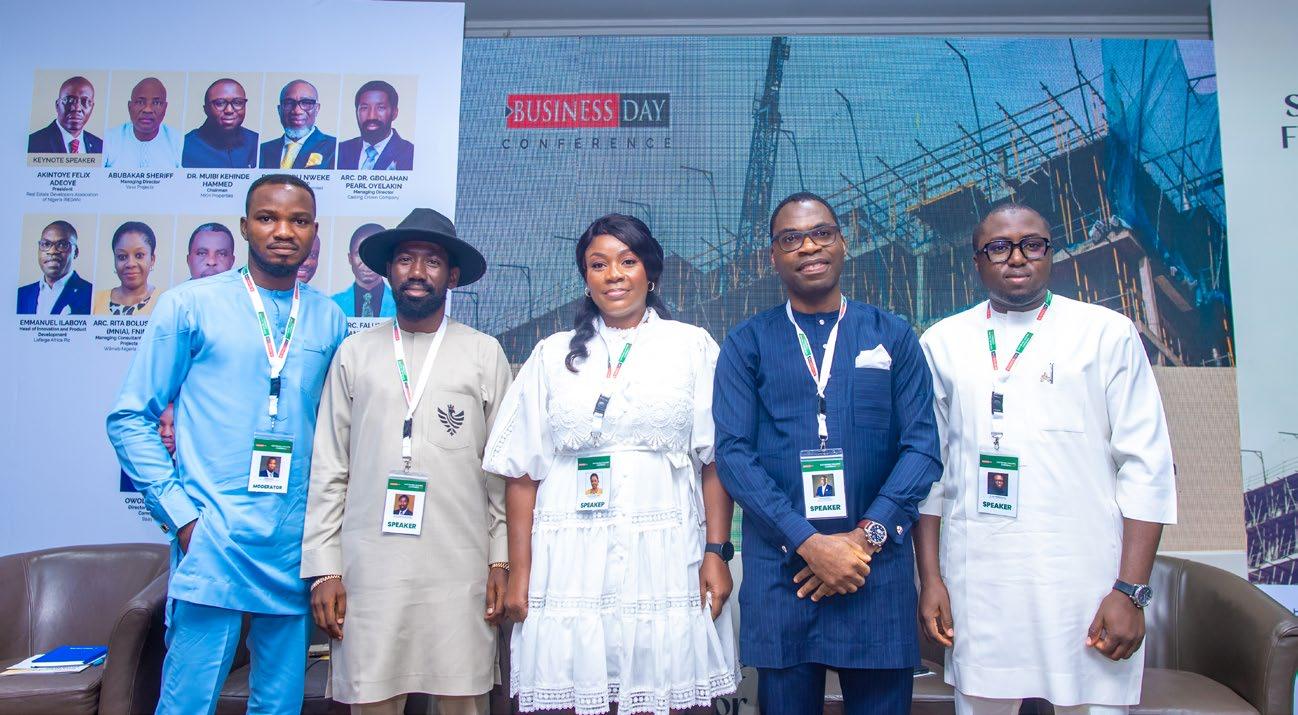
BY FELIX IFIJEH
The Nigerian National Petroleum Company Limited (NNPC Ltd.) has raised the alarm over what it described as a coordinated sabotage campaign targeting its leadership. In a statement issued on Friday and signed by the company’s management, NNPC disclosed that a syndicate comprising both internal and external actors has been actively spreading misinformation and fabricated reports to discredit its top management and derail its ongoing reforms.
The company said the campaign is aimed at undermining its transformation into a transparent, corruption-free, and performance-driven energy company, in line with the mandate of President Bola Tinubu.
According to the statement titled “Coordinated Sabotage Campaign Against NNPC Limited’s
Leadership”, the actors behind the campaign have resorted to planting scandalous and false stories in the media in an attempt to mislead the public and distract its leadership.
“The Nigerian National Petroleum Company Limited (NNPC Ltd.) has uncovered an emerging coordinated sabotage campaign being waged by a syndicate of known and faceless actors, both outside and within various levels of the organisation,” the statement read.
The company noted that the tactics being used include orchestrated falsehoods designed to confuse the public, shake public confidence, and undermine the morale of NNPC’s workforce.
“These are calculated efforts by those who feel threatened by reform, transparency, accountability, and change—clear evidence of the lengths to which they will go to obstruct the transformation of Nigeria’s foremost energy institution,” it said. NNPC warned that more defamatory content may surface in the coming weeks but assured that it remains undeterred in its mission.

It added: “This group is actively spreading lies and misinformation simply to discredit NNPC Ltd.’s leadership and derail the organisation’s ongoing transformation into a corruption-free, performancedriven energy company, in line with the mandate of His Excellency, the President of the Federal Republic of Nigeria.”
“The transformation is underway, and no amount of sabotage will stop it. We urge our dedicated staff, stakeholders, and all patriotic Nigerians to stay focused, ignore the noise, and not be discouraged. We remain on mission,” the statement concluded.
The National Judicial Council (NJC) has ordered the compulsory retirement of 10 judges in Imo State over allegations of falsifying their dates of birth.
The decision was announced in a statement signed by the NJC’s Deputy Director of Information, Kemi BabalolaOgedengbe, following the Council’s 109th meeting held in Abuja on Wednesday.
The meeting was presided over by the Chief Justice of Nigeria (CJN), Justice Kudirat Kekere-Ekun.
The affected judges include five from the High Court— Justices M. E. Nwagboso, B. C. Iheka, K. A. Leaweanya, Okereke Chinyere Ngozi, and Innocent Chidi Ibeawuchi— and four from the Customary Court of Appeal: Justices Tennyson Nze, Ofoha Uchenna, Everyman Eleanya, and Rosemond Ibe.
Justice T. N. Nzeukwu was also recommended for compulsory retirement for presenting himself to be sworn in as Acting Chief Judge of Imo State despite being fourth in the order of seniority—a violation of Section 271(4) of the
1999 Constitution, as amended.
The NJC reiterated its directive to Governor Hope Uzodinma to appoint the most senior judge as Acting Chief Judge.
Meanwhile, the Council cleared nine other judges who were under investigation for similar allegations. Three were exonerated due to the absence of discrepancies in their birth records, while six others were found to have made genuine corrections or provided satisfactory explanations.
In a separate disciplinary measure, the NJC barred Justice Isaac J. Essien of the National Industrial Court from promotion for three years.
He was found guilty of misconduct for ordering the confiscation of over N1 billion belonging to the Nasarawa State Government despite a pending appeal and stay of execution application.
The Council also faulted his refusal to recuse himself from the case and his use of official court letterhead to request

payment of personal gratuity, which was considered a violation of the Code of Conduct for Judicial Officers.
Additionally, four other judges were issued formal cautions for offences ranging from abuse of judicial discretion to delays in delivering judgments beyond the constitutionally allowed 90-day window. Among those cautioned was the Chief Judge of Edo State, Justice Daniel Okungbowa.
The NJC also approved the voluntary retirement of Justice Babatunde Ademola Bakre of the Ogun State High Court and Justice H. O. Ajayi of the Kwara State High Court.
In a related development, the Council recommended 21 candidates for judicial appointments across various states. These include two new Heads of Court for Ekiti and Yobe States, and the appointment of Mainasara Ibrahim Kogo Umar, Esq., as Chairman of the Code of Conduct Tribunal. The recommendations followed a rigorous interview process and a review of public feedback, with 85 percent of the input rated as favourable.




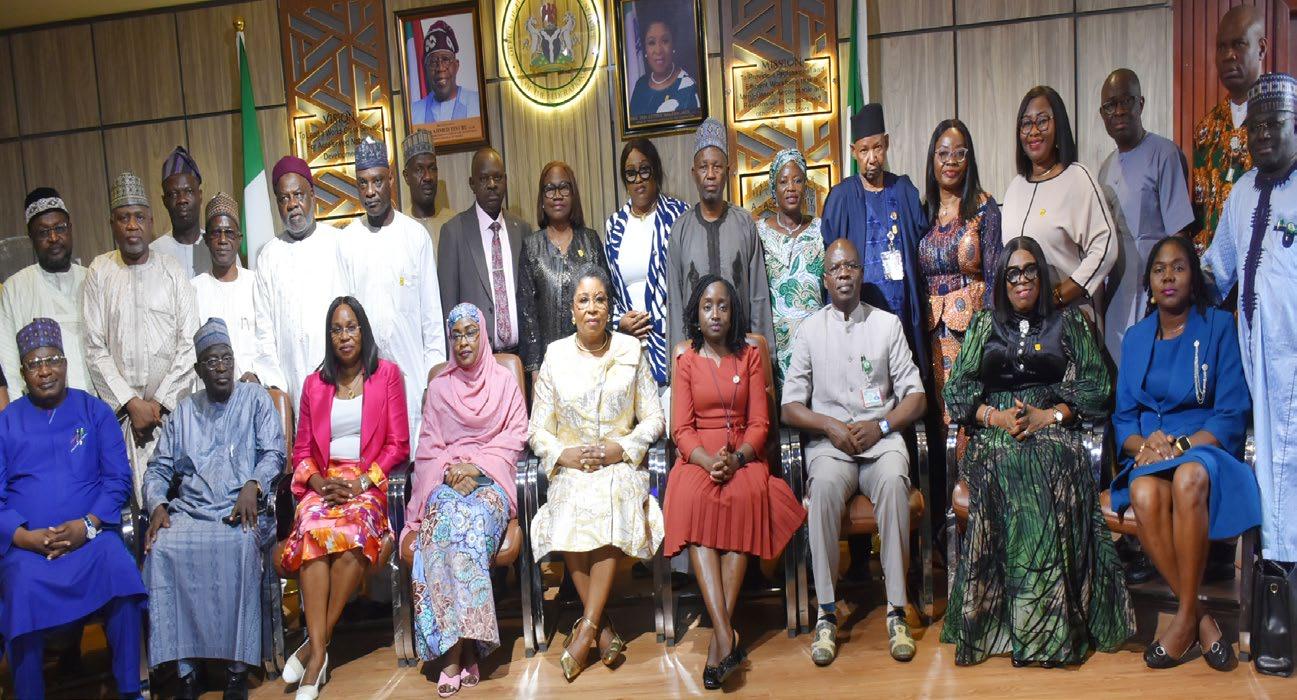
BY
Conflict and instability are taking a devastating toll on the 39 economies afflicted by them, driving up extreme poverty faster than anywhere else, intensifying acute hunger, and pushing several key development goals farther out of reach, the World Bank stated in its latest report.
The report, released on Friday, is the World Bank’s first comprehensive assessment of their plight in the aftermath of COVID-19. According to the report, conflicts have become more frequent and deadly in the 2020s, leading to these economies falling behind all other economies in key indicators of development.
“Since 2020, their per capita GDP has shrunk by an average of 1.8% per year, while it has expanded by 2.9% in other developing economies. This year, 421 million people are struggling on less than $3 a day in economies afflicted by conflict or instability—more than in the rest of the world combined. That number is projected to rise to 435 million, or nearly 60% of the world’s extreme poor, by 2030”, the report stated.
The new study underscores why the global goal of ending extreme poverty has been unattainable so far. It is now concentrated in areas of the world where progress is hardest to achieve. Of the 39 economies currently classified as facing conflict or instability, 21 are in active conflict.
“For the last three years, the world’s attention has been on the conflicts in Ukraine and the Middle East, and this focus has now intensified. Yet more than 70% of people suffering from conflict and instability are Africans. Untreated, these conditions become chronic. Half of the countries facing conflict or instability today have been in such conditions for 15 years or more. Misery on this scale is inevitably contagious”, said Indermit Gill, the World Bank Group’s Chief Economist. In developing economies in general, the report noted, “Extreme-poverty rate has been whittled down to single digits—just 6%. In economies facing conflict or instability, however, the rate is nearly 40%. Their GDP-per-capita levels, currently about $1,500 a year, have barely budged since 2010—even as GDP per capita has more than doubled to an average of $6,900 in other developing economies. Moreover, unlike other developing economies, economies struggling with conflict or instability have been unable to create enough jobs on average to keep pace with population growth. In 2022, the latest year for which such data are available, more than 270 million people were of working age in these economies— but barely half of them were employed.”
For World Bank Group’s Deputy Chief Economist and Director of the Prospects Group, M. Ayhan Kose, “Economic stagnation—rather than growth—has been the norm in
economies hit by conflict and instability over the past decade and a half. The global community must pay greater attention to the plight of these economies. Jumpstarting growth and development here will not be easy, but it can be done—and it has been done before. With targeted policies and stronger international support, policy makers can prevent conflict, strengthen governance, accelerate growth, and create jobs.”
The report established that on a five-year basis, the frequency and lethality of conflicts have more than tripled since the early 2000s. The toll has been evident across the spectrum of development indicators. At 64, average life expectancy in economies suffering from conflict or instability is seven years lower than in other developing economies. Infant mortality rates are more than twice as high. Acute food insecurity afflicts 18% of their population—18 times the average in other developing economies. Ninety percent of school-age children do not meet minimum reading standards.
Once they get started, conflicts tend to be persistent—and their economic effects are both grave and long-lasting, the research shows. Half of economies facing conflict or instability today have faced those conditions for 15 years or more. Highintensity conflicts—those that kill more than 150 out of every 1 million people—are typically followed by a cumulative drop of about 20% in GDP per capita after five years.
The Member representing Yagba East Constituency in the Kogi State House of Assembly, Hon. Emmanuel Obaro, has presented an account of his stewardship over the last two years, receiving widespread applause and a resounding endorsement for a second term in 2027 from his constituents.
The endorsement came during a town hall meeting, empowerment programme, and a two-day free medical outreach organized by the lawmaker in Isanlu, the administrative headquarters of Yagba East Local Government.
The well-attended event, titled “Two Years of Legislative Excellence: Reviewing Our Journey, Renewing Our Commitment,” was aimed at celebrating Hon. Obaro’s achievements and further connecting with the people.
In his address, Hon. Obaro described the gathering as a moment of reflection and gratitude. He reiterated that the empowerment initiative targeted at over 300 beneficiaries across various wards was designed to directly touch lives and promote inclusive socio-economic development.
“This event is not just to mark two years in office, but to reaffirm our commitment to grassroots development. Despite the litigation that followed my election, which cost us time and resources, we stayed focused on delivering the dividends of democracy,” Obaro stated.
He further revealed that each of the ten wards in the constituency had 30 beneficiaries selected for support with N40,000 each to boost their businesses or alleviate personal needs.
“Thanks to Governor Ahmed Usman Ododo, who released N15 million in constituency allowances. His commitment to inclusive governance has allowed us to bring this vision to life. The Governor wants everyone carried along, especially those who haven’t felt the government’s impact,” he added.
The lawmaker emphasized that this initiative reflects both his personal pledge and the shared vision of the state government to uplift the most vulnerable in society—small business owners, widows, artisans, and youths. Chairman of Yagba East Local Government, Hon. Joshua Dare Monday, commended Hon. Obaro’s transparency and people-oriented leadership style.
Also speaking, former Yagba East Council Chairman, Alhaji Abdulganiyu Salaudeen, praised Obaro for setting a new benchmark in constituency representation.

BY FELIX IFIJEH
One of the legacies the late Oluwarotimi Akeredolu left behind as governor of Ondo State was a memorial park he built in honour of the June 5th, 2022 murderous attack victims at St Francis Catholic Church in Owo. Exactly three years later, that gesture to humanity is now the subject of controversy among supporters and adversaries. Over 50 persons died in that attack, which drew local and international condemnation.
The ongoing disagreement has been stirred after the Lucky Aiyedatiwa suddenly demolished the monument. The government said it acted following pressure from the Olowo of Owo and his council, who tagged the park’s location near the palace a cultural taboo and an abomination. The Catholic Diocese in the state, Mrs Betty Akeredolu and aides to the late governor have taken up arms in protest against the demolition.
According to the Catholic diocese, the act is “a violation of our common respect for the dignity of life”. The Diocese which said it wrote to the governor seeking an explanation for the demolition and got no reply, said the “park had served as a communal space for remembrance and healing and was not a burial ground, contrary to claims from those opposed to its location.”
“We recall that when protests arose last year regarding the site, the diocese issued a statement making it clear that the space was a Memorial Park and NOT a graveyard,” it added, adding that it has also demanded an official explanation for the demolition, clarity on whether the site will be relocated or erased entirely, and details of any future plans to honour the victims’ memory.
But the Council of the Olowo of Owo, His Imperial Majesty, Alayeluwa, Oba Ajibade Gbadegesin Ogunoye III, which disclosed that the request for this action was at the instance of the king and the entire good people of the kingdom, said the it had “advised anyone with any issues whatsoever against the demolition to make the palace their target and not the listening Governor, Hon. (Dr.) Lucky Orimisan Aiyedatiwa, who is not in any way, responsible for the demolition.”
It added that the decision to site the structure in that particular location was resisted by the Olowo-in-Council and frowned upon by the people of the community when it was being conceived by the administration of the late Governor Akeredolu, who, it said, dismissed the Council’s objection.
All advice to the late governor that celebrating the dead in any guise around the palace is not in conformity with the age-long culture and traditions of Owo was definitely dismissed. Even at a time a protest was made by concerned Owo youths and stakeholders to that effect which the late governor disregarded.
The above position of the palace is vindicated by the enthusiasm shown by Owo people and the deluge of commendation across sundry media platforms in support of the demolition.
Taking to her X platform at the weekend, ex-First Lady of the State Betty Akeredola, cried blue murder. “What kind of leadership defiles the memory of innocent souls in such a callous manner?, “ she screamed, “That monument, built by my late husband, Governor Oluwarotimi Akeredolu, SAN, CON, a son of Owo, was a solemn tribute to lives violently cut short in a house of worship. It symbolized collective mourning, remembrance, and healing.
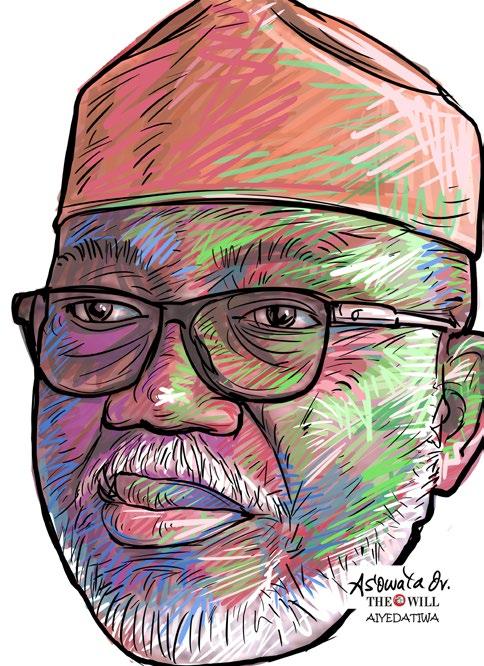
“To now dismiss it as having “no economic value,” and to demolish it for a so-called “world-class shopping complex,” reveals a disturbing level of moral bankruptcy. A world-class society does not erase its pain to make way for profit. It preserves memory, it honors the dead, and it builds with conscience.”
She referred to the demolition as a political misstep, an affront to decency, an insult to the victims, disrespect to their families, and dishonour the legacy of a governor who governed with empathy and stood for justice.
In his own reaction a former Chief Press Secretary to the late governor, Mr. Olabode Richard Olatunde, refuted claims by the Olowo-in-Council that the park was built without adequate consultation and in disregard to its opposition.
He said the crux of this issue is not the demolition itself, but the unfair attempt to rewrite the facts and tarnish the legacy of a man who followed due process every step of the way.
He disclosed that “a meeting was held at the Governor’s Office, where the Olowo-in-Council granted explicit approval for the project.”
Olatunde listed the traditional leaders in attendance at the meeting to include High Chief Barr. Kunle Ijalana (Adanigbo of Iloro), High Chief Sydney Ogunleye (Akowa of Iloro), High Chief Osuporu, High Chief Famakinwa (Ojumu of Owo), and High Chief Abimbola Omoloja (Olugbaragada). Notably, he said High Chiefs Ogunleye and Omoloja spoke on behalf of the Olowo-in-Council at the meeting.
Those present on the government side were Chief Gbenga Ale, Mr. Dare Aragbaiye, Engr. Raimi Aminu, Pastor Akin Olotu, and Olatunde himself—all Owo indigenes who served in the Akeredolu administration.
“There is no record of any objection from the Olowo-inCouncil or the broader Owo community before, during, or immediately after the construction,” he maintained.
“The first protest emerged on June 30, 2024 — months after Akeredolu’s passing.”
Olatunde further explained that the location of the park, close to St. Francis Xavier Catholic Church, Owaluwa — the site of the June 5, 2022 terrorist attack — was a deliberate choice to preserve the memory of the victims at the actual scene of the tragedy. He added that the land used for the project was already acquired by the Ondo State Government under former Governor Olusegun Mimiko for public interest, and thus was legally designated for such civic use.
He also recounted a significant twist in the land’s history. “When the Olowo later requested a portion of the land, Governor Akeredolu initially agreed. But upon receiving a protest letter from the Arala family — the original owners — citing that it should not be diverted for private use, the governor promptly revoked the allocation to uphold due process,” he stated.
Olatunde noted that Governor Akeredolu was never rigid about the park’s location and had even offered to move the project to Ijebu-Owo or another suitable site within the town, if the palace had expressed discomfort. “If the argument now is that the Olowo-in-Council felt pressured to agree, it must also be acknowledged that options were offered. Nothing was forced,” he said. While acknowledging the authority of the Olowo within his domain and that of Governor Lucky Aiyedatiwa to act on state-owned structures, Olatunde insisted that the focus should not be on rewriting history or discrediting Akeredolu’s legacy.
“If this is what the people of Owo want, so be it. But we must remember that Akeredolu loved this town and worked for its growth. His legacy deserves to be preserved, not dragged through the mud,” he concluded.
By the weekend, accommodation had prevailed. Arguing that the land used for the Memorial Park originally belonged to AgroMore Limited (of No. 1, Oke Ogun Street, Owo), a company owned by Oba Ajibade Gbadegesin Ogunoye before he became the Olowo of Owo but was in 2010, acquired by the Olusegun Mimiko administration from the company for road dualisation while in January 2021 the (Oluwarotimi) Akeredolu reallocated it to the company, Adeniran said that at the time of constructing the cenotaph, there was “no record of official revocation of the land from AgroMore,” thus complicating matters.
However, Governor Aiyedatiwa has commissioned a team of government officials to liaise with relevant stakeholders to make arrangements to build a new cenotaph at a location acceptable to the people of Owo, Adeniran said on Friday.
When the Olowo later requested a portion of the land, Governor Akeredolu initially agreed. But upon receiving a protest letter from the Arala family — the original owners — citing that it should not be diverted for private use, the governor promptly revoked the allocation to uphold due process























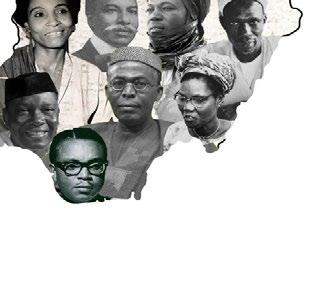






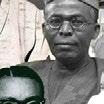








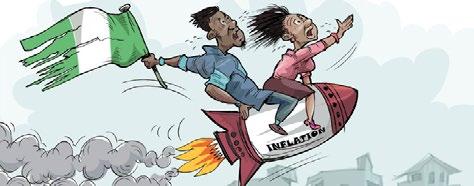


Center Spread Half Page N1, 300, 000
Double Spread N1, 550, 000

Double Spread Half Page N1, 200, 000
10X6 N700, 000
10X5 N650, 000
10X4 N600, 000
10X3 N500, 000
9X6 N440, 000
9X5 N395, 000
9X4 N335, 000
9X3 N310, 000

8X6 N410, 000

8X5 N380, 000
7X5 N320, 000
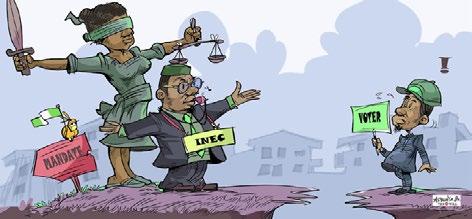



7X4 N315, 000
6X5 N280, 000

6X3 N145, 000
6X2 N85, 000
5X2 N70, 000
4X4 N160, 000
4X3 N95, 000
4X2 N65, 000
3X3 N60, 000
3X2 N50, 000
2X2 N30, 000
2X1 N15, 000
1X1 N7, 000
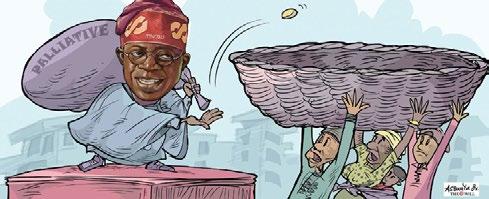
























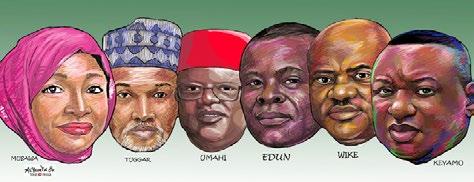

The decision by the Sokoto State Government to open negotiations with bandits with the aim to tame or eliminate insecurity in its enclave shows that it is not only insensitive to current situations but also failed to learn from the past.
At a time hundreds of Nigerians were killed in a wave of violence, particularly in Benue and Plateau States, this decision is unthinkable. Considering that governments in Kaduna, Katsina, Zamfara, even the Nigerian military, failed woefully with a project named ‘repentant terrorists,’ should be enough lesson for any government thinking of adopting the same pattern in tackling insecurity.
For the records, former Katsina State Governor, Aminu Bello Masari, who entered a well-advertised negotiation with terrorists in 2021, celebrated the handover of weapons by the terrorists and paid a huge sum of taxpayers’ money, later lived to rue his decision. Recall that Governor Masara acted with the support of the country’s security networks.
Apart from the Secretary to the State Government, SSG, Police Commissioner and Director-General of the SSS, who were actively involved in the negotiation, the security chiefs at the defence headquarters with whom the governor and his team held meeting sanctioned the talks. According to ex-Governor Masari, a dialogue with Fulani leaders and the vigilantes across the eight LGAs ensued led to an agreement that was signed at Kankara in the presence of all our traditional leaders, including the late notorious Buharin Daji. The bandits returned over 300 guns.
“Later, things gradually returned and life went back to normal before the whole thing took a different dimension, because

Later, things gradually returned and life went back to normal before the whole thing took a different dimension, because those who entered the amnesty among the Fulani were murdered in the bush and that scared away others
“
those who entered the amnesty among the Fulani were murdered in the bush and that scared away others,” said Masari, explaining further that major reason the negotiations the state once had with bandits broke down was because those who entered into the amnesty programme among the Fulani were murdered in the bush and the development scared away the others. Frustrated, he had to ask the citizens of the state to “bear arms and defend themselves against the increasing attacks of the bandits, because it was the only way to go if the state must reduce the level of carnage by the criminals.”
The story is the same pattern with Zamfara under former Governor Bello Matawalle, ex-Governor Nasir el-Rufai in Kaduna State and the Nigeria army under a similar amnesty policy for repentant Boko Haram terrorists pushed by former Chief of Army Staff, General Tukur Buratai, retired. Called “Operation Safe Corridor” the amnesty programme meant to rehabilitate and reintegrate repentant Boko Haram insurgents into society after their de-radicalization, rehabilitation and reintegration, failed.
The dire insecurity situation in Borno and Yobe states are enough evidence that the project failed woefully.
The project failed largely because the people who had suffered pain, broken limbs, homelessness and grieving dead relatives fought against the reintegration of their killers amongst them while many of them still lived in Internally Displaced Persons camps.
In 2019 after the general election, Governor Matawalle vowed to continue with the dialogue and the IGP then supported the move. So too did with the military.
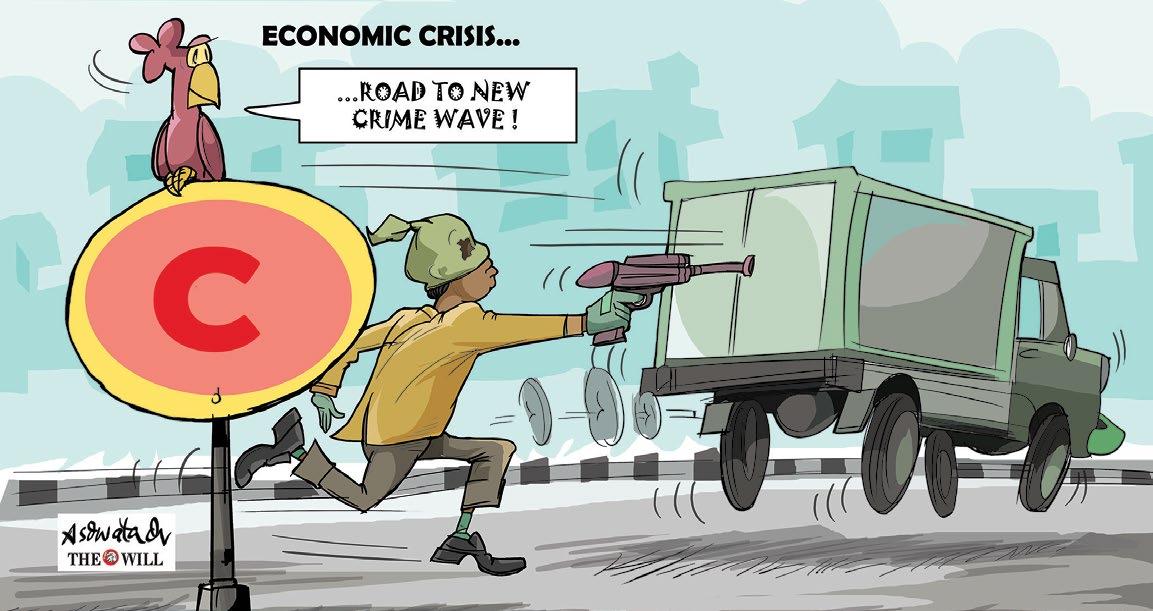


BY ABIODUN KOMOLAFE
The Naira-for-Crude initiative has ignited a profound debate in Nigeria’s economic landscape, yielding tangible results, such as the consistent drop in petrol prices. It is a development warmly received by many citizens.
Meanwhile, the Federal Government’s influence on petrol prices demonstrates its authority, even as it raises fundamental questions about the interplay between state power and economic dynamics. If successfully implemented, the initiative could foster economic stability, diminish foreign currency dependence, and redefine Nigeria’s economic trajectory. However, a pressing question lingers: Should these price drops translate to a reduced cost of living? The main thing about the Naira-for-Crude initiative is that it was thought of at all. For that, the Bola Tinubu-led government, which thought of it, deserves immense credit for conceptualising this initiative! Such is the low level of policy formulation, not to mention implementation, in Nigeria. That said, a key point is to examine the opportunity cost of the initiative, which is crucial to consider. By selling crude in naira to producers, credit leads to a loss of foreign exchange that could have been earned to shore up Nigeria’s perennial balance of payments crisis. This is a significant consideration. In spite of this, the government was correct to focus on value-added local production, which can accelerate real, sustainable development and boost value-creating exports. This kind of forward-thinking is exactly what Nigeria needs, and the government deserves commendation for this initiative.
Obviously, we are not just talking about crude here; we are also talking about its derivatives, which are crucial for local manufacturing production and have export potential. This initiative presents a win-win situation! Properly implemented, it can transform Nigeria into a regional aviation hub for West, Central and even East Africa. The gains will be phenomenal, with significant ripple effects on the aviation industry, including improved pricing, earnings and local job creation. The Federal Government’s efforts are truly commendable!
Another significant development is the healthy competition among major market players, which can drive efficiency and productivity, ultimately benefiting consumers. Nonetheless, this competition also raises concerns about potential market manipulation and the need for effective regulation. The government’s role in ensuring fair competition and regulating the market is therefore crucial.
At a time like this, the role of key stakeholders, such as Aliko Dangote, Africa’s richest man, and Zacch Adelabu, the Executive Chairman of the Federal Inland Revenue Service (FIRS), cannot be overstated. Dangote’s involvement in the initiative has been particularly noteworthy, given his company’s market position. If he hadn’t taken

the risk to build such a massive refinery, the Naira-for-Crude initiative might not have been conceptualised, let alone succeeded. In light of this, Dangote deserves significant praise, especially considering the internal opposition he faced from those benefiting from the status quo. Going forward, this strategic approach of leveraging local competitive advantage for sustainable development and consumer benefits should be extended to other Dangote products, such as cement and sugar. The key point, though, is that it must be implemented with a clear and fair-trading focus. Again, this raises important questions about corporate social responsibility and the distribution of benefits and costs. Implicitly, if Dangote benefits from increased sales and revenue, it can be argued that he has a responsibility to share some of these benefits with consumers.
This brings to mind the clear reservations and murmurs of disaffection about the prices of many essential goods in Nigeria. The question that must be faced and answered is whether these prices are determined by competitive market forces or by cartels, reminiscent of the “robber barons”, who dominated the US economic landscape about 150 years ago. It took President Theodore Roosevelt, who took office in 1901, to initiate policies that eventually curbed the monopoly power of the John D. Rockefellers, the Andrew Carnegies, and the Andrew Mellons.
A striking example of the destructive effect of cartels and monopolies is how Rockefeller’s interests hindered the growth of electric cars. In the early 1900s, electric vehicles dominated the scene, with very few cars running on premium motor spirit (PMS). Rockefeller, controlling a significant portion of the oil refinery industry, needed outlets for his fuel and leveraged his influence over state governments to suppress electric cars. As president, Roosevelt championed government regulation, conservation and social justice, earning him a reputation as a progressive leader. Roosevelt, in particular, publicly accused Rockefeller’s Standard Oil of criminal acts, and in 1911, the US Supreme Court ruled that Standard Oil had violated the Sherman Antitrust Act. Of course, it’s because of Rockefeller that we are seeing electric cars as a new phenomenon. It is actually older than the PMS dominance. Nigeria should learn from this in building a more positive, productive and sustainable political economy.
THE GOVERNMENT’S DECISION TO SELL CRUDE OIL IN NAIRA IS AN EXERCISE OF SOVEREIGN POWER, AIMING TO SHAPE THE ECONOMIC ENVIRONMENT TO ITS ADVANTAGE

Drawing parallels from history to contemporary times, this piece would be incomplete without giving great credit to Adedeji, who also doubles as the Chairman of the Technical Sub-Committee on Domestic Sales of Crude Oil and Refined Products in Naira, and his team. Again,
BY CHETA NWANZE
The ongoing military confrontation between Iran and Israel marks a dangerous new strategic era with far-reaching implications for the African continent. The conflict’s true impact lies not in the immediate exchange of fire, but in the broader geopolitical shifts it heralds. As the world grapples with the fallout from the Middle East hostilities and the ongoing Russia-Ukraine war, a new, overriding priority is emerging for nation-states: the pursuit of absolute security through control over national supply chains–a concept now extending far beyond physical goods to encompass the digital realm.
Recent events demonstrate that from microchips to military hardware and, indeed, to the very applications we use daily, the intricate globalised network for moving goods and services has itself become a battleground. This shift towards ‘supply chain sovereignty’ and digital autonomy will inevitably create friction in the global economy, slowing the free movement of goods and information, and redefining Africa’s strategic challenges.
The conflict’s most visible effect across Africa is economic volatility. For the continent’s major oil-exporting countries, such as Nigeria and Angola, a spike in oil prices creates a brief illusion of a fiscal windfall. However, for the foreseeable future, structural weaknesses, including underinvestment and the terms of long-term contracts, often limit their ability to capitalise on such surges. For the vast majority of African countries that are net energy importers, the consequences are more severe. Rising global energy costs translate directly into higher domestic prices for fuel and transport, exacerbating inflation and putting immense pressure on household budgets and national finances.
Beyond economics, the conflict threatens to destabilise fragile security landscapes. Regions like the Sahel, already contending with extremist insurgencies, could see renewed ideological fervour, while a prolonged Middle East crisis risks diverting the attention and resources of Western security partners away from the continent. While these challenges are significant, the most profound legacy of these new-era conflicts will be the weaponisation of the supply chain itself. Geopolitical struggle is no longer confined to traditional battlefields; it now targets the complex logistical and manufacturing chains that underpin a nation’s military and economic strength and increasingly, its digital infrastructure.
The recent Israeli operation against Hezbollah provided a chilling demonstration of this reality. By compromising the supply chain of pagers, Israeli intelligence was able to tamper with thousands of devices, turning them into remotely detonated bombs delivered directly into the hands of their adversary. The lesson for global security is stark and unambiguous: trust in the integrity of manufactured goods sourced from or passing through complex international networks is broken. Any component, no matter how innocuous, can become a Trojan horse. Similarly, the war in Ukraine has shown how globally sourced components can be assembled into highly effective, asymmetric weapons. Ukrainian drones, reportedly built with a mix of domestic and international parts, were smuggled deep inside Russian territory, using trusted supply chains, and eventually struck, hitting strategic bomber airfields and other critical assets.
This weaponisation of supply chains now extends into the digital realm, highlighting vulnerabilities that were once considered abstract. The recent actions by Iran and the US government underscore a growing distrust in internationally developed digital platforms. During the Israel-Iran conflict, and following stories that the owners of WhatsApp, Meta, had shared location data with the Israeli Mossad, the Iranian government called on its citizens to uninstall WhatsApp and Indian media reported that Iranians began uninstalling Western communication apps, such as WhatsApp, Telegram, and Instagram, opting instead for homegrown alternatives like Eitaa, Soroush, Gap, Bale, Rubika, and Vrasty. This move reflects a broader national imperative to control digital information flows and mitigate perceived foreign interference. A few days later, the US House of Representatives banned WhatsApp from staff devices, citing significant security concerns over data protection and encryption, and instructed staff to use more secure alternatives, such as Signal.
FOR AFRICA, THE CHOICE IS STARK: EITHER INVEST IN SELF-RELIANCE NOW OR REMAIN PERPETUALLY EXPOSED TO THE WHIMS OF AN UNSTABLE GLOBAL ORDER. THE ERA OF BLIND TRUST IN GLOBALISATION IS OVER; THE ERA OF STRATEGIC AUTONOMY HAS BEGUN
These incidents, one driven by geopolitical tensions and the other by inherent security concerns, illustrate a universal realisation: digital platforms, much like physical goods, are supply chains that can be compromised or weaponised. This creates a dual pressure on all nations: first, to secure their incoming supply chains against tampering, and second, to control the outflow of dual-use technologies that could be used against them by an adversary. This applies equally to physical components and digital applications.
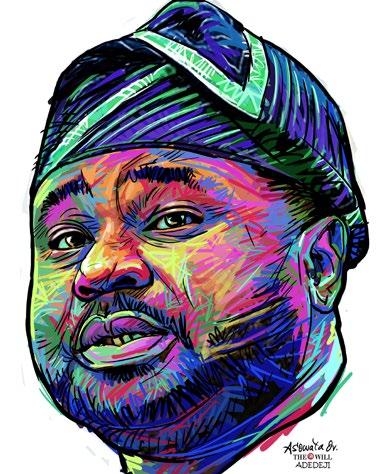
President Bola Tinubu on Jund 26, 2025 signed four new tax laws under a reform aimed at modernising and streamlining the country’s tax system for efficiency and economic growth.
A major highlight is the increase in tax exemption threshold for small businesses from annual turnover of N25m to N50m. It also offers exemption from company income tax for small businesses (tax at 0%) and eliminates withholding tax deduction on business income of small businesses.
To ascertain these conditions, the business owner must submit himself for tax scrutiny by tax consultants – accountants, lawyers and tax practitioners. This will involve filing of annual returns or adequate documentation for approval by the relevant authorities as the claim for any relief must be backed by an audited certification.
This will inculcate the discipline and culture of record-keeping among business owners, irrespective of the size of operation. A wide range of opportunities are therefore open for those saddled with the responsibility of scrutinising business transaction records.
Notwithstanding the applause over the new tax laws, there are fears that they will not eradicate “informal” multiple taxes which also go with “official” extortions, especially at the state and local government levels. These tiers of government are notorious for multiplicity of taxes most of which duplicate one another. For instance, while the states broadly impose environment-related taxes, the local governments also demand similar taxes from the same entities. It is doubtful if, in practice, the new laws would eliminate the countless permits, fees and levies that are seen among the states and local governments.
EDITOR Sam Diala
The Nigerian Exchange Limited (NGX) saw a positive trend in its Pension Index in June, indicating increasing investor confidence in the technology-backed reforms embarked by the Nigerian Pension Commission (PenCom) with a significant rise in pension fund assets.
It also reflects the bullish trend in the equity market as investors reap N13.2 trillion year-to-date when equities market capitalisation rose to N75.96 trillion from N62.76 trillion that opened the first trading day on January 2, 2025. The All-Share Index also climbed to 119,995.76 points during the period against 102,926.40 points in January.
Specifically, for the week ending June 5, the NGX Pension Index rose by 3.48 percent to close at 5,424.62, up from 5,242.42 the previous week. For the week ending June 20, it rose further by 4.21 percent to 5,706.80, and surged to 5,830.11 for the week ending June 27, reflecting a rise of 2,15 percent. This indicates a generally bullish sentiment towards pension-related stocks within the market.
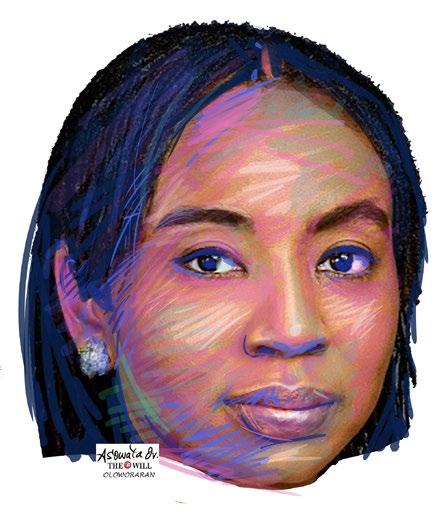
Nigeria’s pension fund assets continued their upward trajectory in April 2025, rising to N23.65 trillion, up from N23.33 trillion recorded in March, according to data from the National Pension Commission (PenCom).
This represents a 1.40 percent month-on-month increase, and constitutes a 19.56 percent growth year-on-year against N19.78 trillion recorded in the corresponding period of 2024.
Stakeholders therefore argue that where small businesses are exempted from some categories of taxes, inflicting “minor” tax injuries on the same entities from the backdoor has not offered the relief celebrated in the coming of the new tax laws.
In the new tax law, the Value Added Tax rate remains at 7.5 per cent despite initial proposals to increase to 12.5 per cent, but its scope is expanded.
Essential items—such as food, education, healthcare, public transport, residential rent, and exports—are zero-rated to ease inflationary Continues on page 35
While the growth could be attributed to sustained investor confidence and strategic asset reallocations across both fixed-income and alternative investment classes, the role of technology cannot be downplayed.
PenCom has accelerated integration of technology into every facet of the pension industry to make the Contributory Pension Scheme (CPS) more accessible and sustainable. It intensified digitising the
daily, weekly, monthly, or as convenient, through cash deposits, electronically, or via CBN-approved payment platforms.
Following this development, PenCom is developing a robust technology-support platform to enhance customer services, including registration, RSA support, and financial advisory, ensuring efficient and effective service delivery.
In a major policy overhaul, PenCom has granted Pension Fund Administrators (PFAs) the full authority to approve and process several categories of retirement benefits without requiring prior approval from the Commission




Continues from page 34
streamlining pension payments and reducing bureaucratic delays in the CPS.
Previously, PFAs were required to seek PenCom’s ‘No Objection’ before disbursing funds to Retirement Savings Account (RSA) holders.
However, under the new directive, PFAs can now process and approve various benefits, including programmed withdrawals, retiree life annuities, benefits for temporarily unemployed individuals, and refunds for those exempted from the CPS.
This means that RSA holders seeking to access their retirement funds will experience a faster and more efficient approval process. With the new framework in place, PFAs must process, approve, and complete payment instructions within two working days of completing the necessary documentation.
The new directive is expected to enhance service efficiency and accelerate pension benefits processing. RSA holders will no longer have to wait for PenCom’s approval before accessing funds, resulting in a more seamless experience for retirees and individuals eligible for benefits.
By empowering PFAs to fully execute their statutory functions, PenCom is reinforcing the autonomy of pension administrators while maintaining regulatory oversight. Technology will play a huge role in achieving the objective.
“PenCom must install appropriate technology in order to cope with the challenge of the new policy, as well as address infractions by defaulting
entities,” said Ademola Johnson, a pension analyst. In this regard, PenCom has stepped up measures to deal with actions that could sabotage the 21-year-old scheme.
pressure.

The President/Chief Executive of the Dangote Group, Alhaji Aliko Dangote, has reaffirmed that the Group will soon list the Dangote Fertiliser Limited on the Nigerian Exchange (NGX). He assured shareholders that those investing in Dangote Fertiliser Limited would not need to worry about the value of the local currency, as the company operates within a dollarised business framework.
He noted this during a courtesy visit to the Dangote Petroleum Refinery & Petrochemicals and Dangote Fertiliser Limited by capital market stakeholders in Lagos.
Dangote further disclosed that the company is working on expanding its fertiliser plants to boost revenue, with a target dividend payment to shareholders exceeding $3 billion.
“In the next 40 months, our fertiliser business should generate $20 million in revenue per day. We are pushing hard. We expect to reach over $70 billion in revenue and possibly pay dividends of $3–4 billion. Our philosophy is to always think big,” he said.
He added that the Group is also strengthening its cement business by investing in new plants and targeting clinker exports to West African countries, which will boost revenue and provide better dividends for shareholders.

For instance,tThe Commission has said it will blacklist organisations that fail to meet their pension remittance obligations from November 10, 2025.
The Director-General of PenCom Ms Omolola Oloworaran who announced the warning during a media parley held in Lagos on June 18, said it is now “zero tolerance for non-compliance” as the Commission adopts a firmer stance to enforce the 2014 Pension Reform Act.
“Every organisation, public, private, big or small, must comply with pension remittance obligations. No exceptions, no delays.
“All Pension Fund Administrators and Custodians have been directed to ensure every vendor, service provider, and counterparty has a valid Pension Clearance Certificate (PCC) that indicates that they have been up to date and compliant with pension contributions.
“By November 30 this year, any entity without a PCC will be blacklisted and cut off from pension business with all PenCom regulated entities.”
PenCom has reported significant progress in clearing pension arrears. All retirees who exited the service up to March 2025 have now received both their accrued pension rights and ongoing monthly entitlements.
Revenue allocation is restructured as follows: 30 percent of VAT proceeds are distributed based on consumption (rather than contribution), 50 per ent equally among states, and 20 per cent to population-based allocation.
With the latest development, it is expected that state revenue streams will increase, and it will also discourage tax evasion.
The tax reforms benefits are itemized below:
A. Households and individuals including the youth:
1. Complete exemption of low-income earners up to N1m p.a. (about N83k per month) from PAYE
2. Reduced PAYE tax for those earning a monthly salary of N1.7m or less
3. Zero (0%) VAT on food, healthcare, education, electricity generation and transmission
4. VAT exemption on transportation, renewable energy, CNG, baby products, sanitary towels, rent and fuel products
5. Tax break for wage award and transport subsidy to lowincome earners
6. Tax incentives for employers to hire more people incrementally than in the previous 3 years
7. Exemption of stamp duties on rent below N10m
8. PAYE tax exemption for other rank and armed forces fighting insecurity
9. Friendly tax rules for remote workers and digital nomads
10. Clarity on taxation of digital assets to avoid double taxation and allow deduction for losses
B. Small Businesses:
1. Increase in tax exemption threshold for small businesses from annual turnover of N25m to N50m
2. Exemption from company income tax for small businesses (tax at 0%)
3. No withholding tax deduction on business income of small businesses
4. Exemption from the requirement to deduct and account for tax on payments to vendors
5. Simplified statement of
*Continues online at www. thewillnews.com
Emphasising that Nigeria cannot attain its $1 trillion economy target without a vibrant stock exchange, Dangote affirmed his continued engagement and support for the NGX, acknowledging its crucial role.
During the visit, Umaru Kwairanga, Group Chairman of Nigerian Exchange Group (NGX Group) praised the President/Chief Executive, Dangote Group, Aliko Dangote for his substantial contributions to the Nigerian capital market and private sector development.
Kwairanga, who called for the listing of Dangote Petroleum Refinery and Dangote Fertiliser on the NGX, stated that it would represent a natural progression in the Dangote Group’s journey towards transparency, market leadership, and inclusive wealth creation.
Noting that the Nigerian capital market takes great pride in Dangote and his contributions to the economy, he commended the impact of the Dangote Petroleum Refinery on the Nigerian economy, stressing that the various initiatives introduced have provided muchneeded relief to Nigerians.
Kwairanga recalled Dangote’s tenure as President of the Council of the Nigerian Stock Exchange, describing him as a visionary whose leadership shaped the capital market landscape.
“Through the listing of companies such
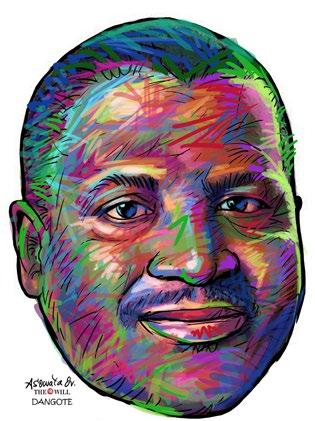
as Dangote Cement Plc, Dangote Sugar Refinery Plc, and NASCON Allied Industries Plc, the Group has significantly deepened market liquidity, boosted investor confidence, and driven long-term value creation for shareholders,” he stated.
Also present were the CEO of NGX, Temi Popoola; Managing Director/CEO of Central Securities Clearing System Plc (CSCS), Haruna Jalo-Waziri; CIS President, Oluropo Dada; ASHON Chairman, Sam Onukwe; CEO of NGX Regulation, Olufemi Shobanjo; CEO of Lagos Commodity Exchange, Akeredolu Ali; and other major stakeholders.

The NGX chairman emphasised that the visit was more than a tour; it was a reaffirmation of the NGX’s commitment to aligning investment capital with national development goals.
“So, what are we aiming to do to bring about a major revolution in the capital market? The main challenge is that many investors are hesitant, thinking, ‘If I invest my naira now, by the time I receive dividends in ten years, the naira will have lost value.’ However, we are entering the market with a dollarised business model,” he explained.
The Vice President of Oil & Gas at Dangote Group, Edwin Devakumar, who led the delegation on a tour of the facilities, described the construction of the 650,000-barrel-per-day refinery as a monumental achievement that demanded immense courage, vision, and determination. He noted that the Group acted as its own Engineering, Procurement, and Construction (EPC) contractor for the refinery—a feat never before attempted at this scale.
He also stressed that the refinery has ensured Nigeria is no longer reliant on imports to meet its petroleum needs and is now exporting refined products to various continents worldwide.
Dangote had emphasised that listing the Dangote Fertiliser on the NGX would be a step towards revolutionising the stock market.

BY MONSURU DUROJAIYE
For much of Nigeria’s financial history, merchant banking has quietly played a foundational, though often underestimated role. From trade finance and corporate advisory in the 1960s to today’s strategic intermediation and capital structuring, the journey of merchant banking has mirrored the nation’s broader economic transformation.
Yet, in recent years, the sector has begun to reassert its relevance, not only as financial intermediaries but also as strategic enablers, helping institutions navigate a more complex, regulated and opportunity-rich environment.
Coronation Merchant Bank (CMB), established under a focused wholesale banking model, stands at the heart of this new chapter. As regulatory clarity improves, financial institutions deepen their need for agility, and Nigeria’s capital markets expand, merchant banks like CMB are emerging as enablers of resilience and catalysts of value across both bank and non-bank segments.
A legacy reclaimed: From trade roots to institutional relevance
The merchant banking sector traces its roots to the 1960s with the emergence of institutions like ICON Limited and Nigerian Acceptances Limited (now Sterling Bank), which provided early support in trade finance, leasing, and project finance. Through the 1980s and 1990s, merchant banks took on a more expansive role which included underwriting public offerings, advising on mergers and acquisitions, managing portfolios, and facilitating restructurings.
The Central Bank of Nigeria’s 2005 consolidation exercise led to many merchant banks merging into larger entities, fading their identity. In 2010, the CBN reintroduced a dedicated merchant banking license, separating them from retail-focused institutions and restoring their corporate-centric mandate. This marked a return to focused, wholesale banking, reimagining merchant banking’s role in a modern economy.
Delivering impact: CMB’s role in Capital Markets, FI banking, and innovation
Over the last decade, merchant banks have repositioned themselves as critical enablers of capital formation, particularly in an era where traditional funding routes are under pressure, and CMB has stepped up with a suite of landmark transactions that reflect both scale and sophistication.
In the capital markets space, the bank played a central role in Access Holdings Plc’s N351bn equity raise and participated significantly in Zenith Bank Plc’s N350.5bn and FCMB Group Plc’s N144.6bn capital offerings. In the debt market, CMB has structured commercial paper transactions for Nigeria’s corporate giants: N232.6bn for Dangote Cement Plc, N125.6bn for Dangote Sugar, and N114.4bn for MTN. In 2023, the Bank led the Coronation Infrastructure Fund’s issuance, raising N8.79bn to support Nigeria’s infrastructure ambitions. Meanwhile, CMB’s role in the N2.821 trillion merger between Access Pensions and ARM Pensions demonstrated its ability to facilitate strategic consolidation at scale.
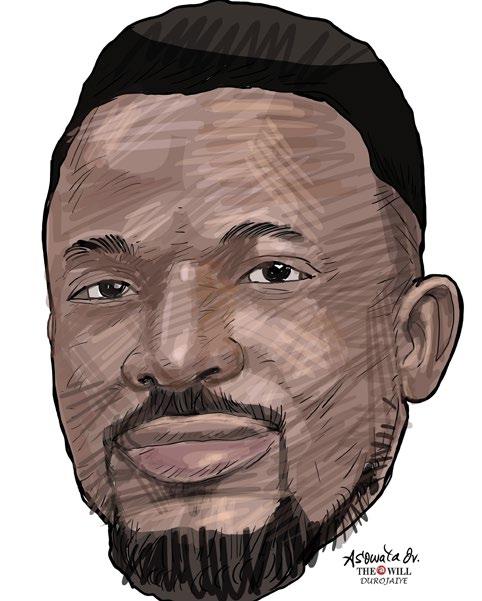
Beyond capital markets, merchant banks are increasingly essential to the broader financial ecosystem, especially within the Financial Institutions (FI) segment. CMB has become a go-to partner for pension fund administrators (PFAs), insurance firms, asset managers, fintechs, and development finance institutions (DFIs). The bank’s support ranges from structured liquidity solutions and advisory to capital raises and regulatory compliance.
Merchant banks, like CMB, excel in delivering specialised services with agility, adopting a hightouch, institution-first approach. They offer curated solutions for deeper financial structuring needs and are embracing innovation through digital onboarding platforms, embedded financial services, API connectivity, and solution-driven treasury tools to improve client experience and deepen competitiveness.
As Nigeria’s economy contends with multiple inflection points, from rising capital thresholds to shifting demographics and fast-growing institutional savings, the merchant banking model is primed for reinvention. Within the asset management space, the steady rise in assets under management (AUM) is fuelling demand for diversification beyond traditional fixed income, prompting merchant banks like CMB to introduce foreign currency investment products, custodial solutions, and thematic vehicles that expand the investment landscape.
At the same time, Nigeria’s pension industry, with its multi-trillion-naira pool of long-term savings, presents a compelling opportunity to channel patient capital into productive sectors such as infrastructure and real assets. CMB is uniquely positioned to structure investment solutions that align with pension fund obligations, thereby deepening market participation and fostering

As Nigeria’s economy contends with multiple inflection points, from rising capital thresholds to shifting demographics and fastgrowing institutional savings, the merchant banking model is primed for reinvention
sustainable growth.
Meanwhile, the insurance sector, on the cusp of recapitalisation and consolidation under the Nigeria Insurance Industry Reform Bill, offers another frontier. As insurers strive to meet new solvency thresholds, merchant banks can step in as transaction advisors and underwriters, facilitating capital raises, strategic mergers, and regulatory realignment efforts with the expertise and precision the moment demands.

Fintechs represent the most dynamic frontier. As these firms mature from consumer-focused platforms into infrastructure-scale institutions, their capital needs are becoming more complex. Merchant banks like CMB can serve as structuring partners and funding collaborators, offering liquidity tools, regulatory guidance, and B2B financial infrastructure that help fintechs scale responsibly.
In this shifting landscape, the role of the merchant bank has evolved from transactional financier to strategic partner. Institutions today are not merely seeking capital; they seek assurance that their partners understand regulatory nuance and can structure solutions with precision. This is where CMB continues to stand out.
From its strategic partnerships with DFIs like Proparco and Fiducia for expanding supply chain financing for mid-sized corporates to its investment in digital treasury infrastructure, CMB is driving innovation across enterprise banking. This helps in bridging Nigeria’s vast infrastructure gap by structuring project bonds, preparing bankable Public-Private Partnerships, and collaborating with Ministries, Departments, and Agencies (MDAs), subnational governments and DFIs to deliver real assets.
In doing so, merchant banks are becoming catalysts, mobilising capital, fostering trust, and converting ambition into investable opportunities that advance national development and economic resilience.
To remain relevant and impactful, merchant banks must go beyond execution. They must serve as longterm partners, offering not just capital but confidence. Institutions are looking for trusted hands to guide them through uncertainty, and CMB is responding by building lasting relationships anchored in deep expertise, agile thinking, and unwavering client commitment.

Nigeria, Africa’s most populous nation and one of its largest economies, stands at a pivotal crossroads. Despite its immense potential to drive regional growth and integrate into the global economy, the country’s infrastructure deficit—estimated at $100 billion annually by the African Development Bank (AfDB)—remains a major obstacle to sustainable development.
From crumbling roads and unreliable power supply to inadequate healthcare and limited digital connectivity, the gaps in infrastructure continue to undermine productivity and discourage both local and foreign investment.
The country’s infrastructure challenges are vast. Nigeria’s road network, crucial for trade and mobility, spans around 195,000 kilometres. Yet over 70 percent of these roads are in poor condition (Federal Ministry of Works, 2023), driving up transportation costs, delaying deliveries, and limiting access to markets, especially for small businesses and farmers.
Nigeria’s rail infrastructure is also limited. Despite recent investments, the country has only 3,500 kilometres of operational track, insufficient for a population exceeding 220 million.
Power generation remains a bottleneck. Installed capacity stands at 12,500 MW, but average output is just 4,000 MW due to transmission losses and gas supply issues (Nigerian Electricity Regulatory Commission, 2024). This leaves Nigeria’s per capita electricity consumption at just 144 kWh annually, far below the global average of 3,131 kWh (World Bank, 2022). Businesses spend an estimated $29 billion yearly on backup energy sources like diesel generators (IFC, 2023).

Healthcare is not spared. With only 0.5 hospital beds per 1,000 people and around 40,000 doctors for a population of over 220 million, Nigeria’s doctor-to-patient ratio stands at 1:5,500—well above the WHO’s recommended 1:1,000.
The consequences are clear: Nigeria accounts for 14 percent of global maternal deaths despite representing only 2.6 percent of the world’s population (UNICEF, 2023). Digital infrastructure also lags. Only 53 percent of Nigerians have internet access, and broadband penetration is 45 percent, compared to 70 percent in South Africa (Nigerian Communications Commission, 2024). With over 60 percent of Nigeria’s population under 25, this shortfall curtails the potential of its young, tech-savvy population.
This infrastructure deficit presents both a challenge and an opportunity. Private capital mobilisation has worked elsewhere. India’s highway sector attracted $20 billion in private investment between 2018 and 2023, resulting in 50,000 kilometres of new roads. Nigeria has a dynamic private sector and a growing institutional investor base. The potential exists—if systemic barriers are removed. Institutional assets, including pension and insurance
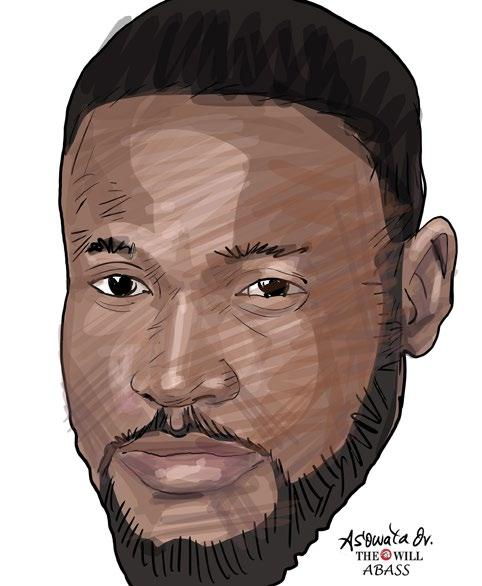
funds, now exceed $100 billion. Yet less than 5 percent is invested in infrastructure, compared to 15 percent in South Africa (AfDB, 2023).
Private equity and venture capital flows to Nigeria reached $1.2 billion in 2023, but little of this was directed to infrastructure (AVCA, 2024). This underinvestment is driven by a trust deficit; policy inconsistency, currency volatility, and weak contract enforcement all weigh heavily.
Several structural and perception-driven barriers stand in the way of investment:
a. Limited data availability: Reliable sector-specific data is often lacking. For instance, poor data on Nigeria’s estimated 14,000 MW solar energy potential (Renewable Energy Master Plan, 2022) makes it difficult to build investor confidence in off-grid solutions.
b. Policy and regulatory uncertainty: Frequent shifts in policy, such as the abrupt 2023 fuel subsidy removal, create unpredictability. Weak legal frameworks and slow contract dispute resolution further dampen interest.
c. Currency volatility: The 60 percent naira depreciation between 2022 and 2024 erodes the value of infrastructure investments backed by foreign exchange.
d. Delayed disbursements: Development finance institutions like AfDB and IFC disbursed $2.5 billion to Nigeria in 2023, but slow bureaucratic processes often increase project costs and delivery times.
e. Perceived risk: Despite relatively low sovereign default rates, investors remain wary due to governance issues and security concerns, which raise the cost of capital.
To address these barriers and mobilise private capital, several steps are necessary:
Despite relatively low sovereign default rates, investors remain wary due to governance issues and security concerns, which raise the cost of capital
Improve data transparency: Government agencies and the Nigeria Sovereign Investment Authority (NSIA) should publish reliable data and conduct feasibility studies—such as exploring the country’s 700,000 MW hydropower potential (NIIMP, 2020)—to build bankable investment pipelines.
Strengthen PPP frameworks: Nigeria currently has 52 active PPP projects valued at $14 billion. Standardised contracts, sovereign guarantees, and effective dispute resolution mechanisms are needed to scale this model.
Derisk investments: Multilateral bodies should expand the use of political risk insurance and partial credit guarantees. NSIA’s Infrastructure Fund, which uses firstloss capital to derisk projects, is a strong template.
Streamline capital disbursement: DFIs and private investors need to balance due diligence with timely disbursement. The delays that plagued AfDB’s $200 million power sector investment in 2024 should be avoided.
Support first-mover projects: Pilot projects, particularly in renewable energy and digital infrastructure, can demonstrate viability and attract follow-on investment.
The Katsina Wind Farm $25 million in private capital (Federal Ministry of Power, 2023) is an example.
Stabilise the macro environment: sustained monetary policy, improved FX liquidity, and judicial reform are critical. The Central Bank of Nigeria’s 2024 intervention, which helped reduce naira volatility by 20 percent (CBN, 2024), is a step forward.
Nigeria’s infrastructure deficit is not just a challenge—it is also an investment opportunity. With over $100 billion in domestic assets and rising global interest in Africa, the potential to close this gap is real.
Projects like the $2.8 billion AKK Gas Pipeline (NNPC, 2024), funded through a mix of public and private capital, show what is possible when risk is addressed and project bankability is assured.
To move forward, Nigeria must reset its investment narrative. Infrastructure is more than a development goal—it is the foundation of economic competitiveness. The need to mobilise private capital is urgent, and the window for action is narrowing.
•Abass is a qualified investment professional and Associate Chartered Accountant (ACA).
Photo Editor: Peace Udugba [08033050729]
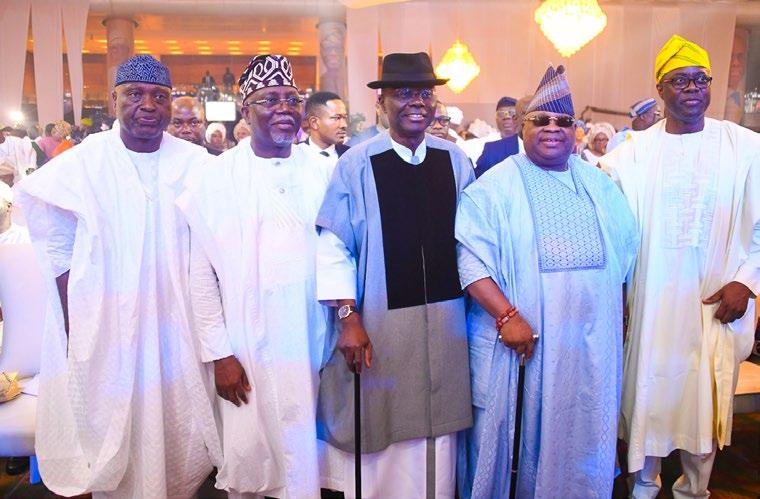
L-R: Southwest Governors, Mr. Biodun Oyebanji (Ekiti); Mr. Lucky Aiyedatiwa (Ondo); the celebrator, Mr. Babajide Sanwo-Olu (Lagos); Senator Ademola Adeleke (Osun); and Engr. Seyi Makinde (Oyo); during a special thanksgiving service to mark the 60th birthday of Governor Sanwo-Olu, at the Eko Hotels and Suites, Victoria Island in Lagos, on Wednesday, 25th June, 2025.
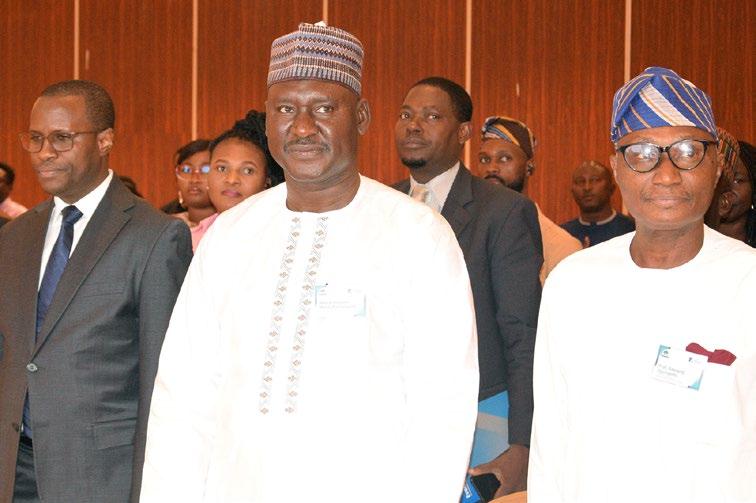
L-R: Chairman, ICPC, Dr. Musa Aliyu; Executive Director, Civil Society Legislative Advocacy Centre (CISLAC),Auwal MusaRafsanjani and Professor of Economic History, Obafemi Awolowo University, Ile-Ife, Prof. Adetunji Ogunyemi, during a 1-Day Dialogue on Local Government Autonomy in Nigeria, organized by CISLAC in collaboration with Konrad Adenauer Stiftung (KAS) in Abuja recently.

L-R: Corporate Communications Executive, Airtel Nigeria, Princess Osehobo; Learning Team Coordinator, 3MTT, Theophilus Osifo; Community Coordinator, 3MTT Lagos State, Oluwaseyi Ayodele and Lead, Corporate Social Responsibility, Airtel Nigeria, Victoria Ndu during, the 3MTT Programme Launch and Industry Mixer, supported by Airtel Nigeria as part of its continued sponsorship of the Three Million Technical Talents (3MTT) of the Federal Government, held in Lagos recently.
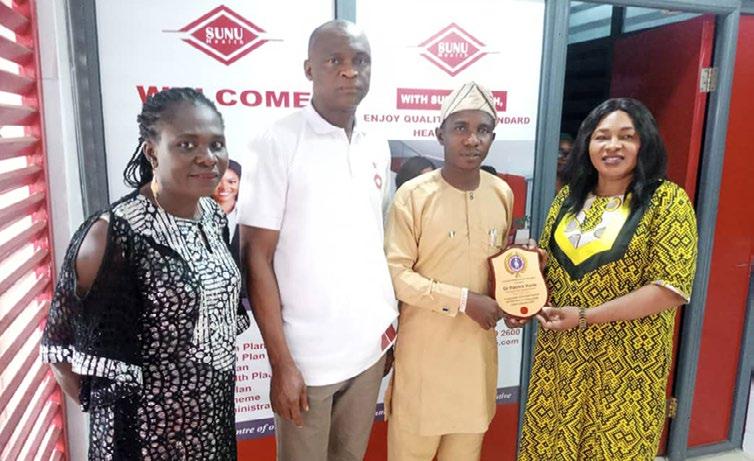
and
Organisation,
on June 22, 2025.
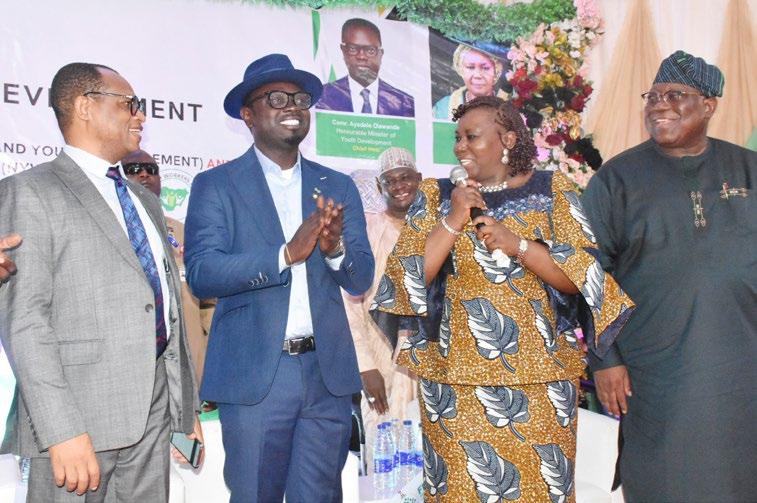
L-R: Permanent Secretary, Federal Ministry of Youth Development, Mr. Olubunmi Olusanya; Minister of Youth Development, Comrade Ayodele Olawande; Acting Vice Chancellor, University of Abuja, Prof. Patricia Lar and the Chairman, Federal Civil Service Commission, Prof. Tunji Olaopa, during a workshop on the professionalization of Youth work in Nigeria, organised by the FMYD in collaboration with University of Abuja, Centre for Gender Studies Security and Youth Advancement in Abuja on Tuesday,June 24, 2025.
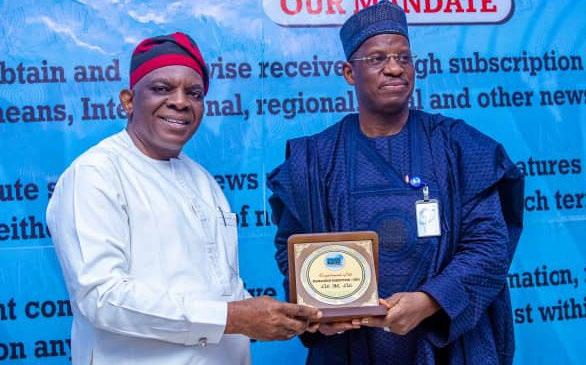
Director, News Agency of






BY JUDE OBAFEMI
Favour Ofili, a sprinter whose career once lifted Nigerian hopes on the global track, has reportedly submitted documents to switch her allegiance to Turkey. This development, following her repeated clashes with Nigeria’s athletics administration, is coming amid growing concern over the treatment of elite national athletes.
Also, coming after key oversights from the Athletics Federation of Nigeria (AFN) and the Nigeria Olympic Committee, Ofili’s move signals deep fractures in how promising talents are managed at home and reflects wider global trends in sporting nationality.
At 22 years old, Ofili has risen quickly through the ranks. Born in Port Harcourt in December 2002, she first gained attention with strong performances at age group events. She won silver in the 400 metres at the 2019 African Games and added a bronze in the 200 metres at the World Under-20 Championships in the same year.
While at Louisiana State University, she set an African indoor record in the 200 metres in 2022, ran a personal best of 10.93 seconds in the 100 metres, and lowered the 200-metre mark to 21.96 seconds, establishing herself as Nigeria’s fastest female sprinter over that distance . Her rise exceeded expectations when she entered the final in the women’s 200 metres at the Paris 2024 Olympic Games, finishing sixth in her debut final .


Yet, these achievements were marred by two significant administrative failures. Ofili qualified for the Tokyo 2020 Olympics but was barred from competing owing to Nigeria’s failure to complete mandatory antidoping tests. She was among 14 athletes who missed out on the Games, an outcome that left her publicly frustrated. When she qualified again for the 100-metre event at Paris 2024, she was omitted from the start list. Although she competed in the 200 metres and reached the final, she expressed intense disappointment in a social media post that later drew an investigation.
These errors were neither quickly nor properly addressed. An investigative committee was set up after Paris to examine the omissions in Ofili’s Olympic entry, but its recommendations, such as financial compensation and an apology, left much to be desired. With ongoing harm resulting from that oversight, Ofili reportedly relayed her frustration to the Athletics Integrity Unit, stating that her decision to switch allegiance was not motivated by money but by frustration.
Formal requests appear to have been lodged with the Athletics Integrity Unit and World Athletics, beginning 31 May 2025. The AFN and the National Sports Commission (NSC), however, have stated that no official communication has been received. The AFN president described the matter as “sad, disheartening and painful” but noted that the federation would not stand in her way.
The NSC claimed that Ofili remains a Nigerian athlete and that she continues to benefit from the Elite Athletes Programme, which provides grants of $20,000 per year.


Nigeria is not alone in losing its athletes in recent years. Several former Nigerian champions switched nationality at the peak of their careers. Gloria Alozie now runs for Spain, Francis Obikwelu represented Portugal and Femi Ogunode competed for Qatar. The trend extends beyond Nigerian borders. Turkey has sought talent globally and has reportedly offered athletes such as Jamaican discus gold medallist Roje Stona and shot-put bronze medallist Rajindra Campbell initial bonuses of $500,000, plus monthly support. Ofili is likely to benefit from a similar arrangement. One report suggests that athletes who switch to Turkey could receive up to $500,000 as signing bonus, monthly stipends and kit provision.
Under World Athletics rules, athletes moving from one eligible country to another must wait for three years before representing the new nation. In exceptional situations, however, this waiting period can be waived, if the former federation is found to have failed its duties or if the athlete has suffered as a result. Ofili’s case may qualify, given the documented administrative failures. There is, however, no guarantee of a waiver. Until a decision is made, she may be barred from major international events until 2027 or 2028.
Authority voices in Nigerian sport have warned that Ofili’s move reflects much larger governance problems. Chioma Ajunwa, the nation’s first individual Olympic gold medallist, has described the mass departure of talented athletes as a sign of leadership failure within sports administration. Experts suggest that the AFN and NSC must be held accountable when they fail to support athletes consistently and transparently.
There are also implications at the global level. Nations like Turkey, Qatar and Bahrain have actively recruited athletes, offering financial guarantees, modern training systems and international exposure. While acquiring ready talents can improve medal chances, critics argue that such practices may disrupt the essence of national representation and turn sport into transactional exchange.
For Nigeria, Ofili’s potential departure comes at a crucial moment. She remains one of the few women globally capable of consistently running under 11 seconds for 100 metres and under 22 seconds for 200 metres. Her presence at the next World Championships in Tokyo in September 2025 and the Paris 2028 Olympics would likely have been a focal point for national athletics. With her switch, those hopes could shift to Turkey.
Rethinking how athletes are supported has therefore become even more urgent. Administrators must treat athletes with professionalism, ensure prompt and error-free entry into competitions, and remove barriers to participation. Without this, more talents like Ofili may look elsewhere for respect and opportunity.
Favour Ofili’s talent was nurtured in Nigeria. While she will forever carry that legacy, her decision highlights a failure worth national reckoning. If she succeeds under a different name and flag, it will reflect less on her ability and more on the broken systems she had to outrun.
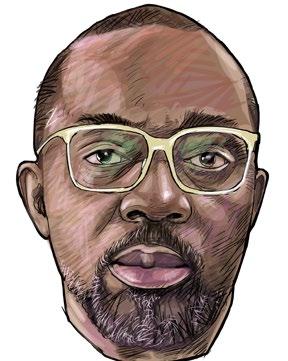

ogannah@thewillnews.com
In the Federal Capital Territory, a health crisis has gripped the six Area Councils for over four months, as health workers have sustained an indefinite strike, closing primary healthcare centres and leaving thousands of residents, particularly in rural communities, without essential medical services. The strike, driven by demands for the N70,000 national minimum wage and payment of salary arrears, exposes deep governance failures.
While the Federal Capital Territory Administration prioritises high-profile infrastructure projects, such as the costly renovation of the International Conference Centre, the neglect of health and education workers reveals a focus on initiatives that enhance personal visibility over addressing critical public needs. The funds allocated to such projects could have significantly alleviated the crises in healthcare and education, raising questions about the government’s commitment to citizens’ welfare.
The human impact of the strike is severe. The suspension of maternal and child health services, including antenatal care and immunisations, endangers vulnerable populations. Across the Federal Capital Territory’s 3.5 million residents, the closure of primary healthcare centres has disrupted interventions for malaria, tuberculosis, and HIV, forcing families to travel long distances for care or resort to unregulated alternatives, increasing risks of untreated illnesses and preventable deaths.
The strike stems from health workers’ demands for unpaid wages and the N70,000 minimum wage. In March 2025, unions representing health and education workers directed a “sit-at-home” action across the six Area Councils—Abaji, Bwari, Gwagwalada, Kuje, Kwali, and Abuja Municipal. Despite the FCTA approving N4 billion in April to address these issues, the funds have not been disbursed, deepening distrust. The Area Council chairmen’s refusal to engage in dialogue has prolonged the crisis, reflecting a failure of coordination between the Administration and local authorities.
The Nyesom Wike administration’s focus on infrastructure projects starkly contrasts with its inaction on the strike. The renovation of the International Conference Centre, costing N39 billion, has been a flagship initiative, celebrated with
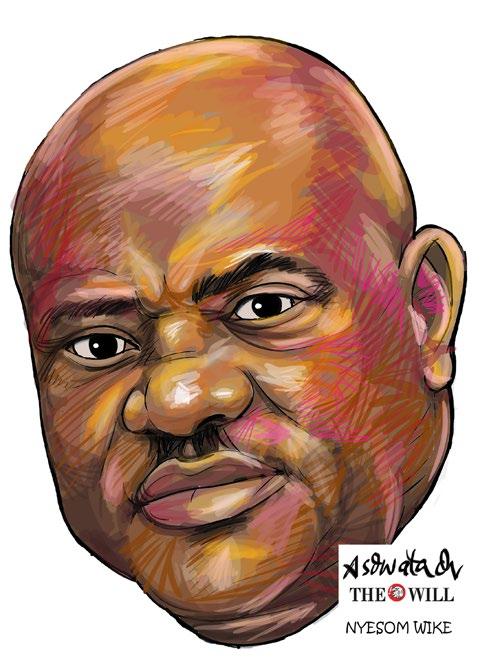
public ceremonies and a high-profile renaming event. The centre, now allegedly fully booked until 2027, is touted as a driver of economic growth, with claims of generating thousands of jobs.
Other projects, such as the 16-kilometre Idu-Zuba Expressway and the Wole Soyinka Interchange Bridge, have also received significant attention. These initiatives, while beneficial, reflect a troubling priority when health and education sectors are in crisis. The N39 billion spent on the International Conference Centre could have cleared salary arrears, reopened primary healthcare centres, and restored public schools, directly addressing the needs of thousands of residents. Instead, the focus on such projects suggests an emphasis on visible, legacy-defining achievements over urgent public welfare.
The health and education crises highlight a governance approach that neglects fundamental rights. The prolonged
closure of primary healthcare centres risks outbreaks of preventable diseases and worsens Nigeria’s high maternal and child mortality rates. The education sector faces similar challenges, with public schools closed since March, denying thousands of children access to learning. The Federal Capital Territory, as the nation’s capital, should model effective governance, yet the ongoing crisis reveals a disconnect between policy priorities and public needs.
The prioritisation of the International Conference Centre’s renovation over resolving the strike is a clear misallocation of resources. The N39 billion could have funded salaries for health and education workers, equipped primary healthcare centres with essential supplies and supported school reopenings. Instead, the administration’s focus on infrastructure projects and ceremonial events suggests a preference for initiatives that enhance personal standing rather than addressing the immediate needs of citizens. This approach undermines public trust and fails to uphold the constitutional right to healthcare and education.
Resolving the crisis requires urgent action. The FCTA must facilitate dialogue with unions to clear salary arrears and implement the minimum wage, ensuring transparent disbursement of the N4 billion allocated. Reopening primary healthcare centres demands immediate staffing and supply provisions, particularly for maternal and child health services.
Long-term reforms should include increasing health budget allocations to meet the Abuja Declaration’s target, improving infrastructure, and addressing brain drain through better working conditions. Public pressure, amplified by civil society and community advocacy, is essential to hold authorities accountable. A coalition of over 40 organisations has called for swift resolution, citing the human cost of inaction.
The Federal Capital Territory’s health and education crises reflect a failure to prioritise citizens’ rights. For mothers in the FCT unable to treat their sick children, the elderly patient denied care, and the students locked out of classrooms, this crisis is a daily struggle. The government must act to restore trust and uphold the right to healthcare and education, before the damage becomes irreparable.
The N39 billion spent on the International Conference Centre could have cleared salary arrears, reopened primary healthcare centres and restored public schools, directly addressing the needs of thousands of residents